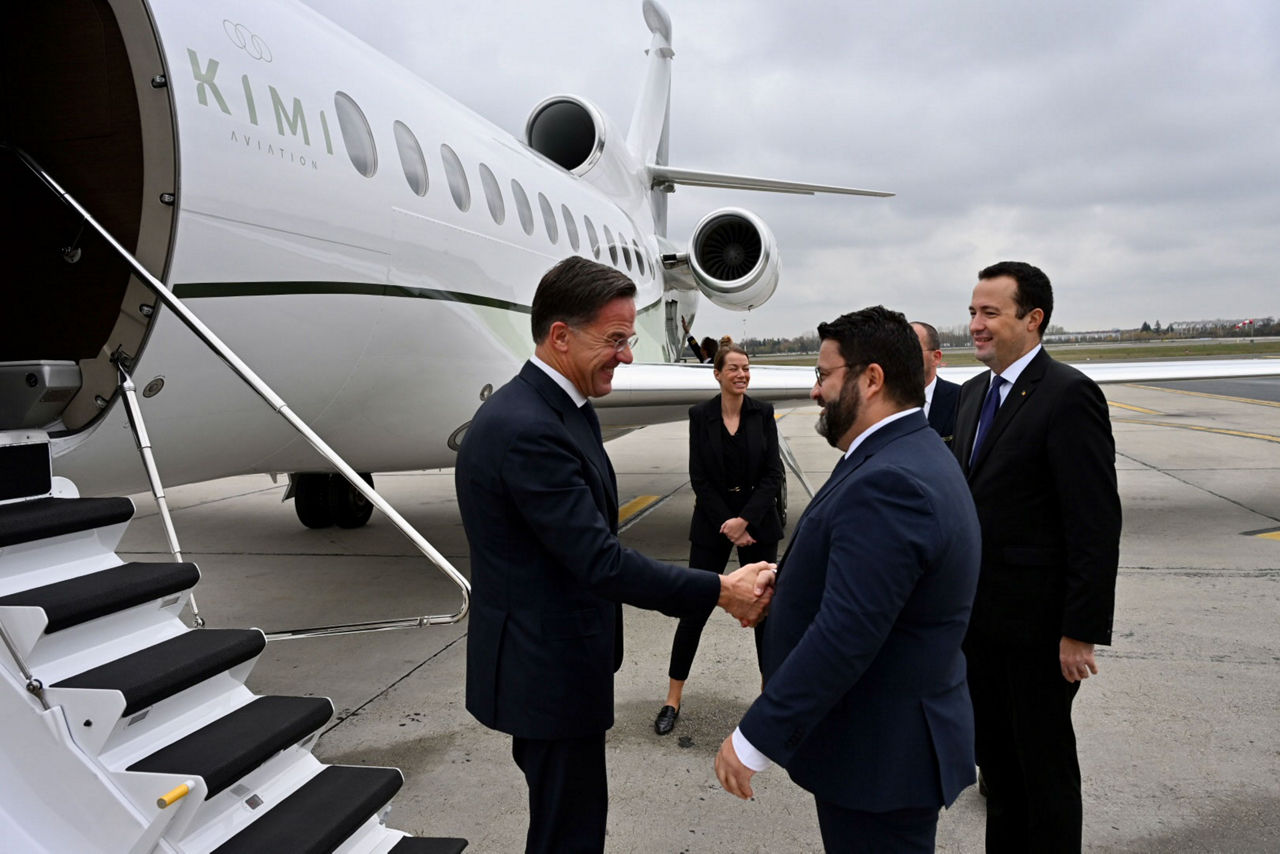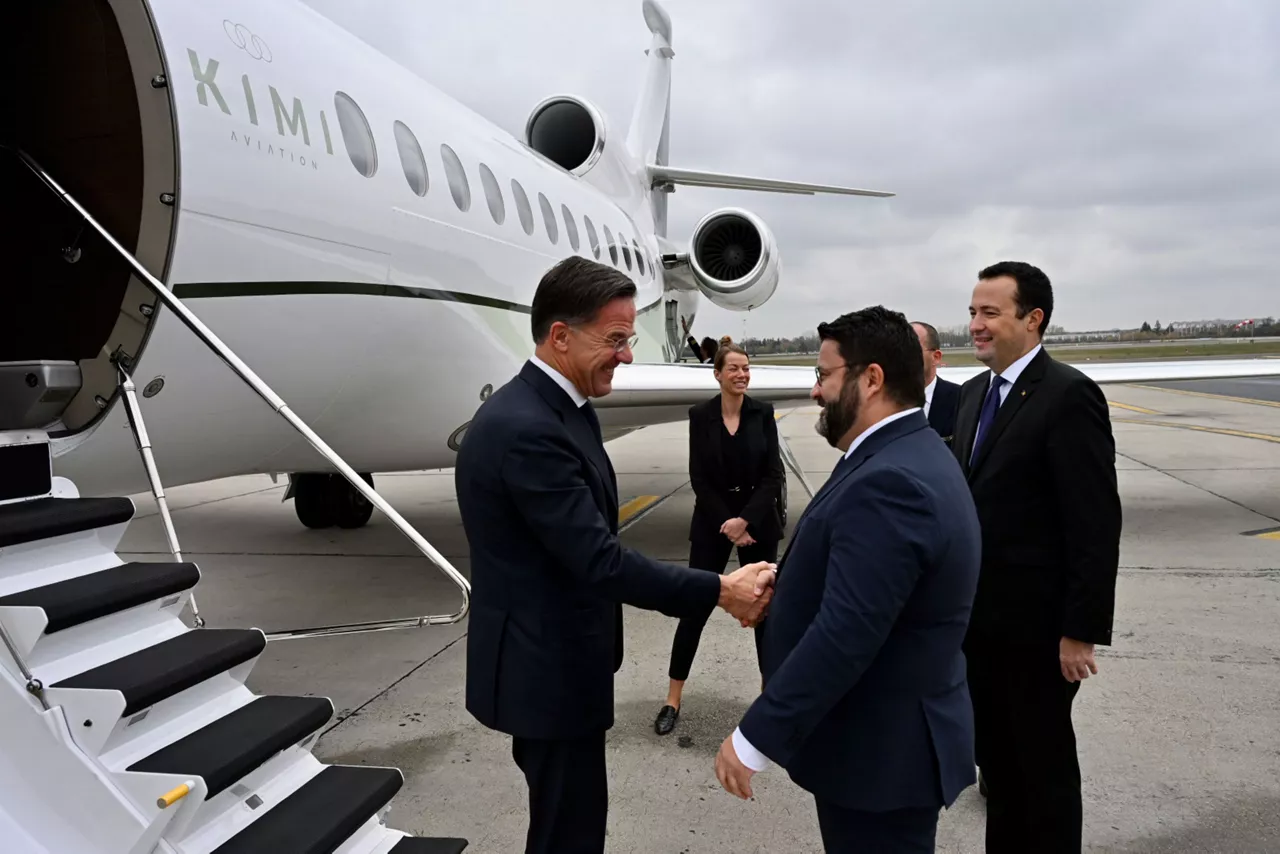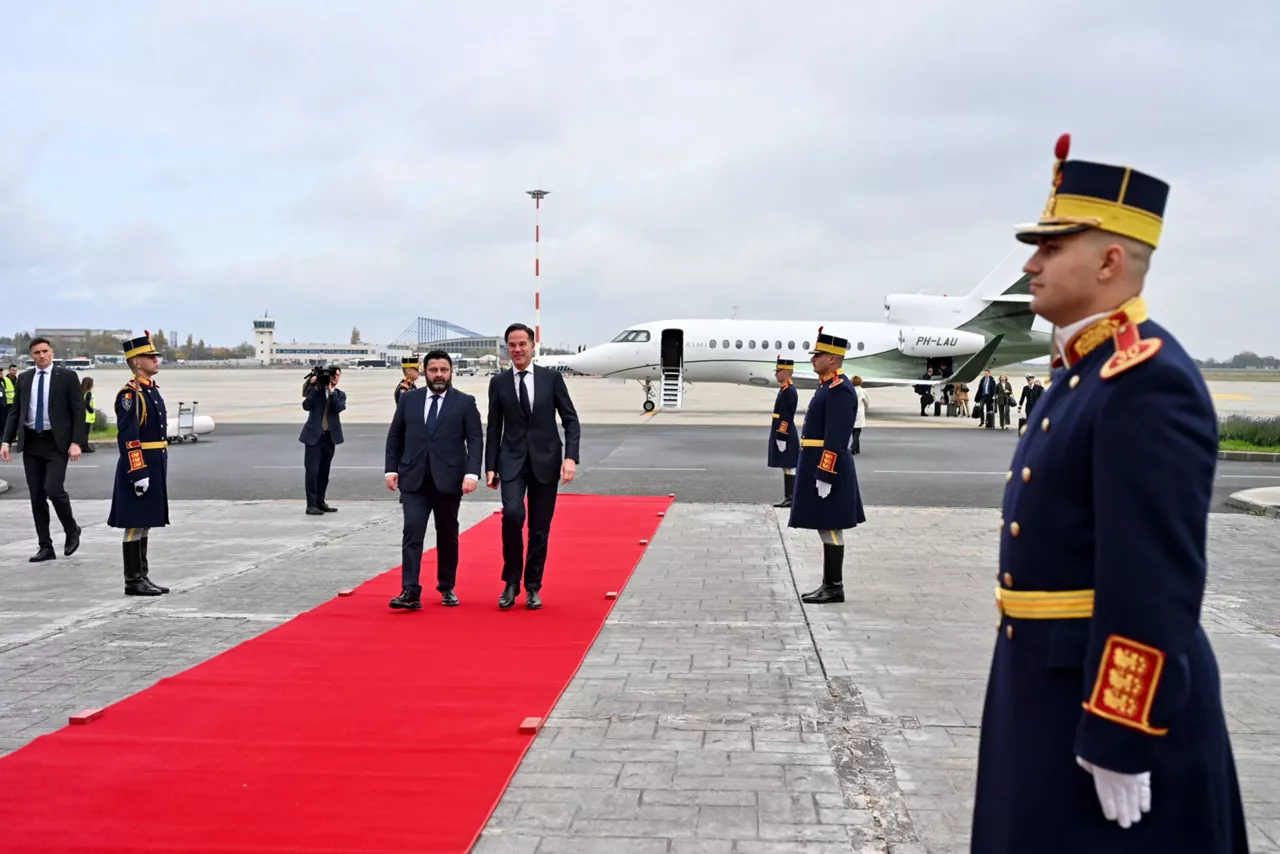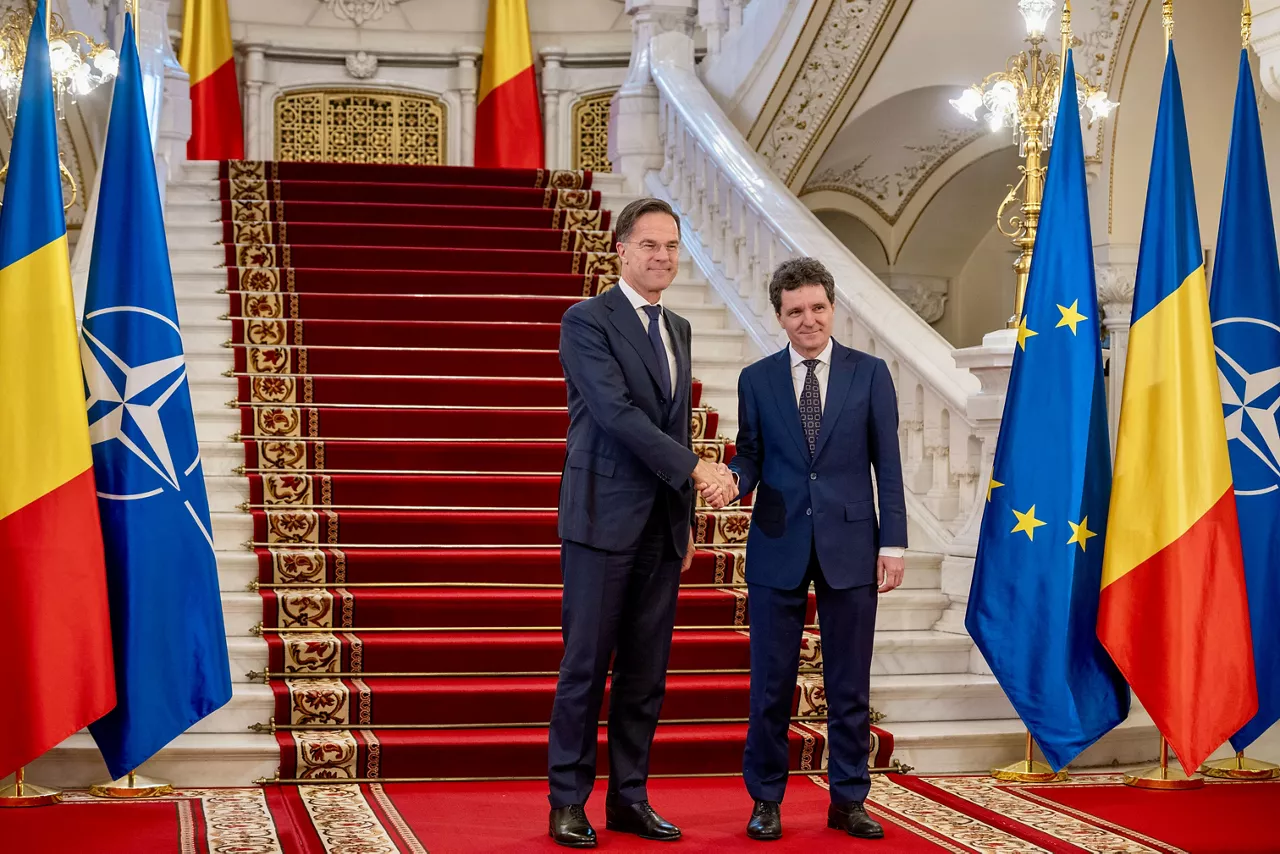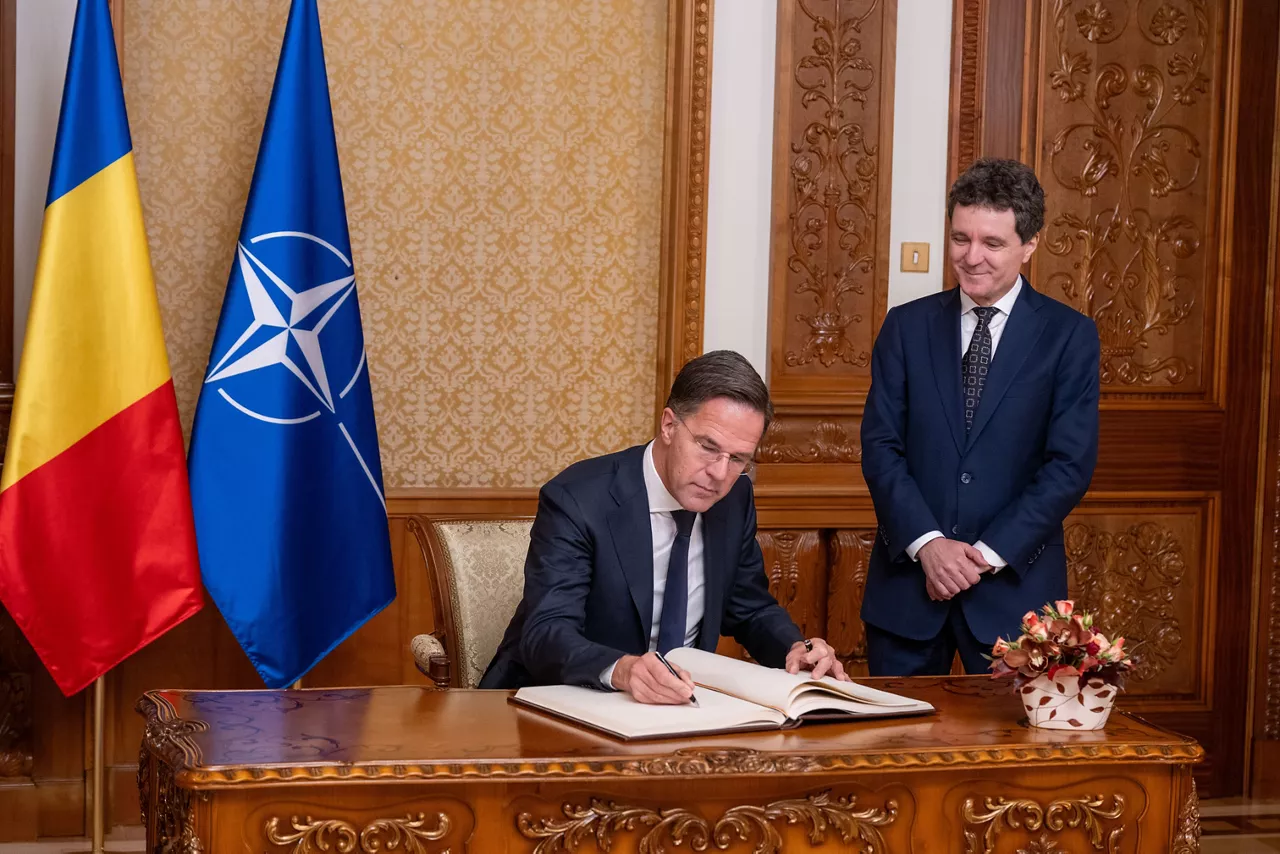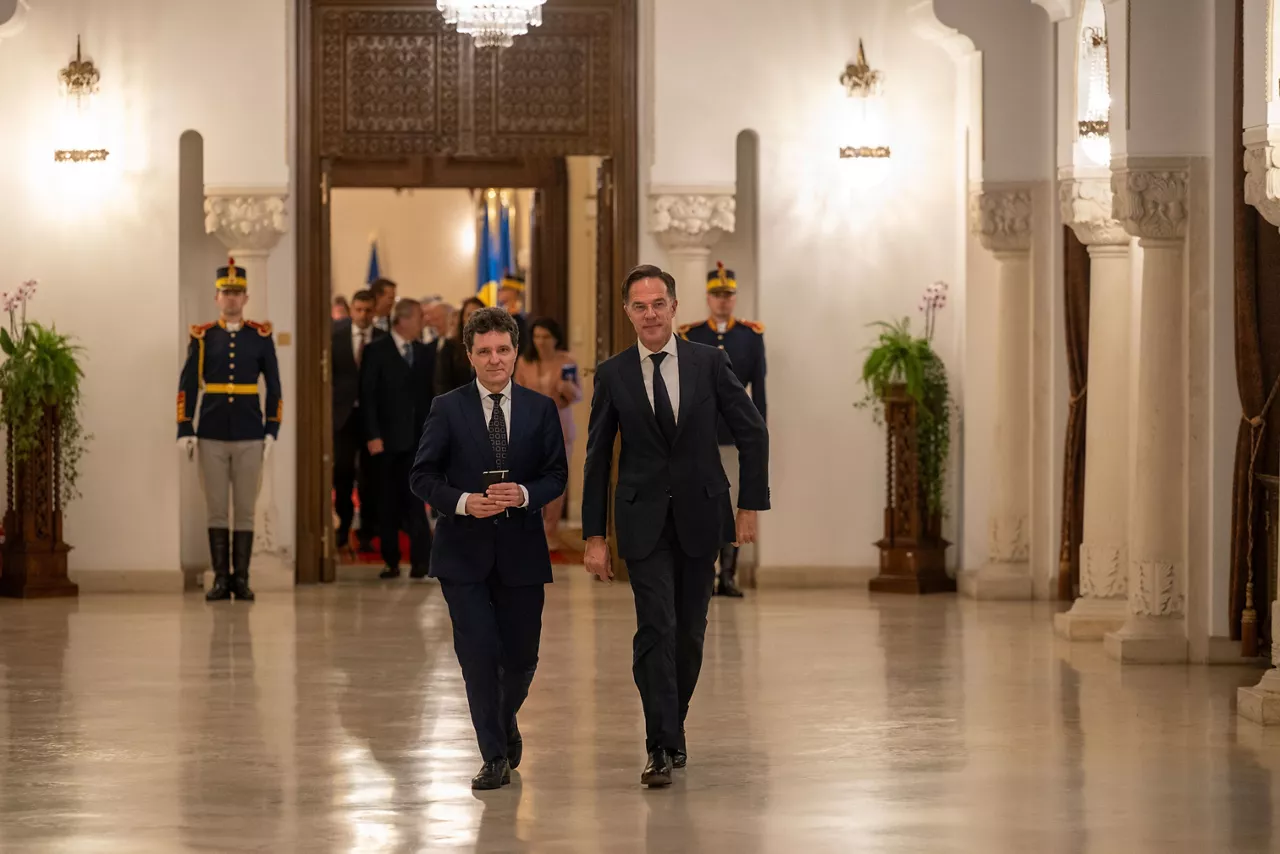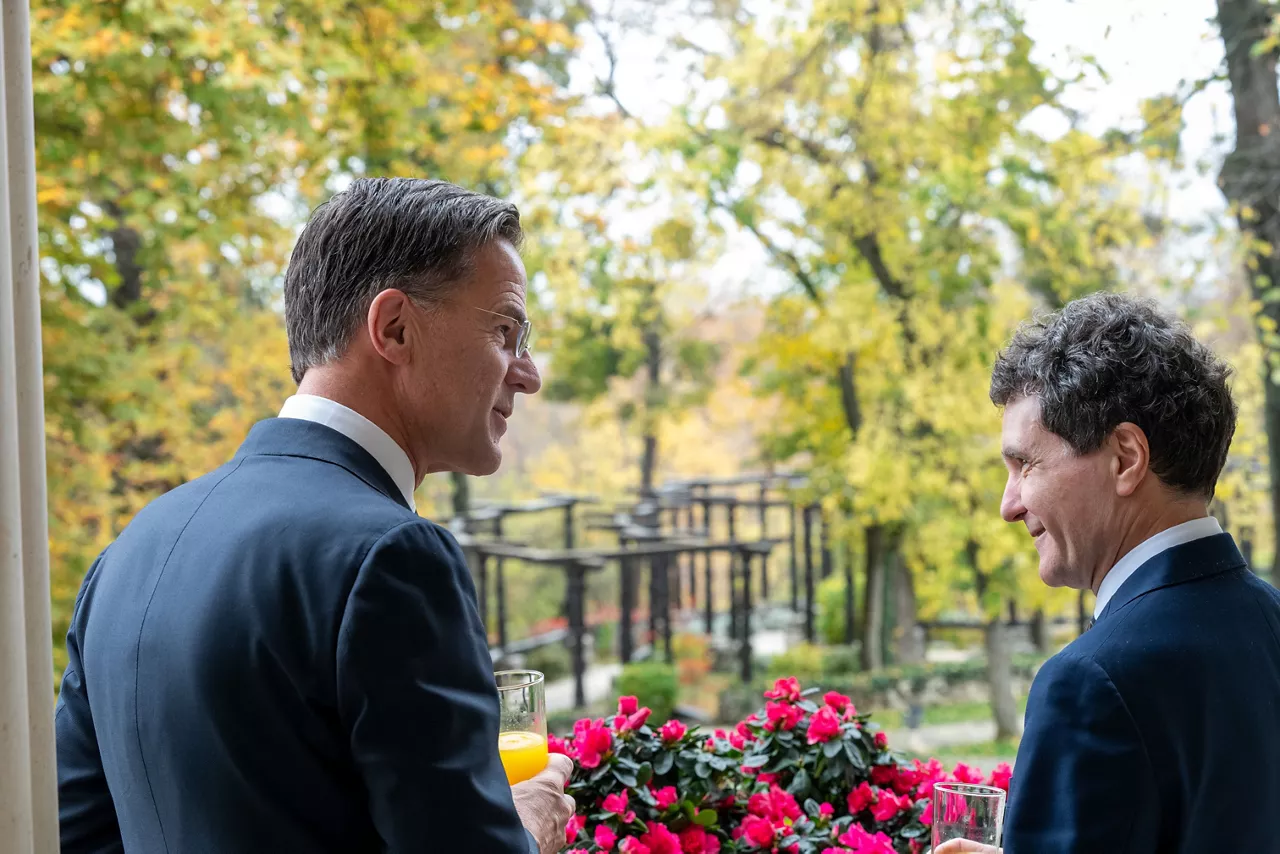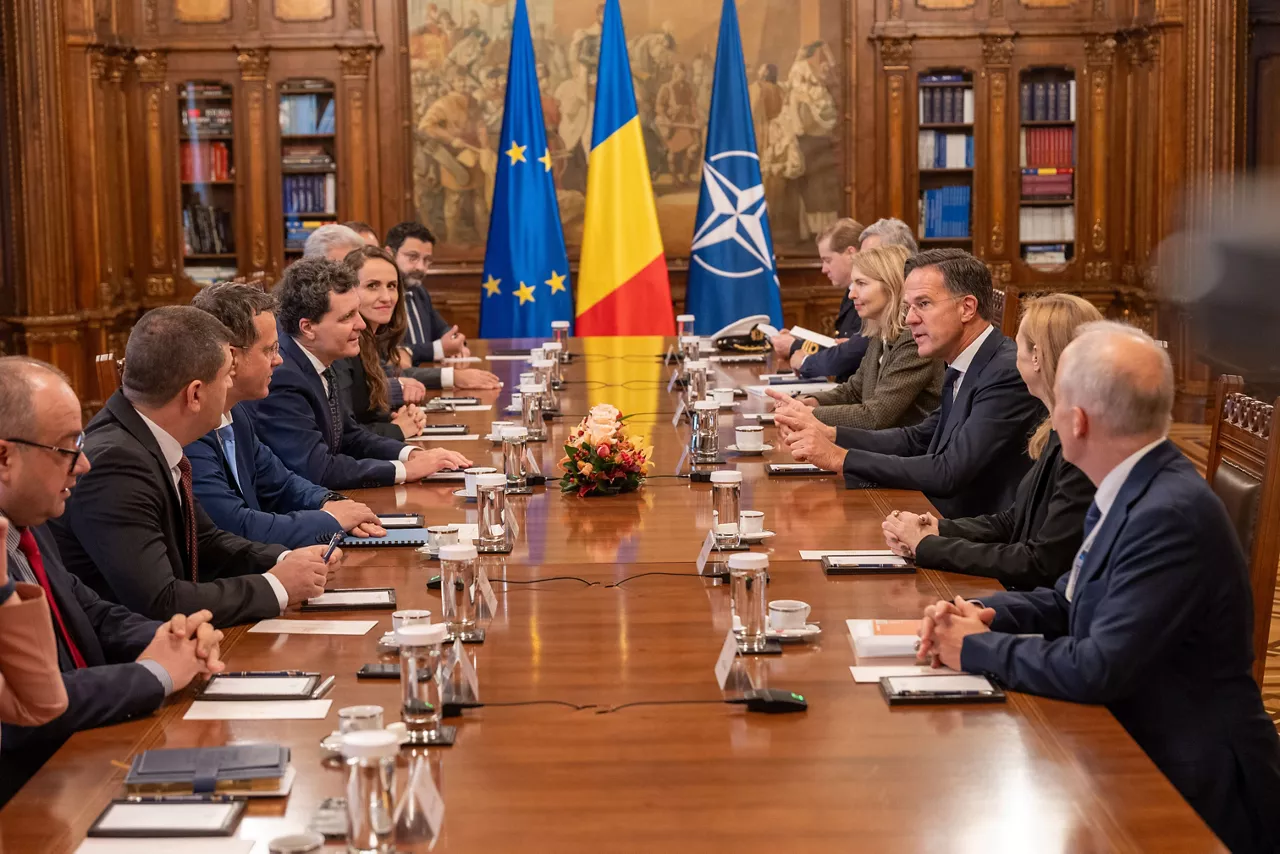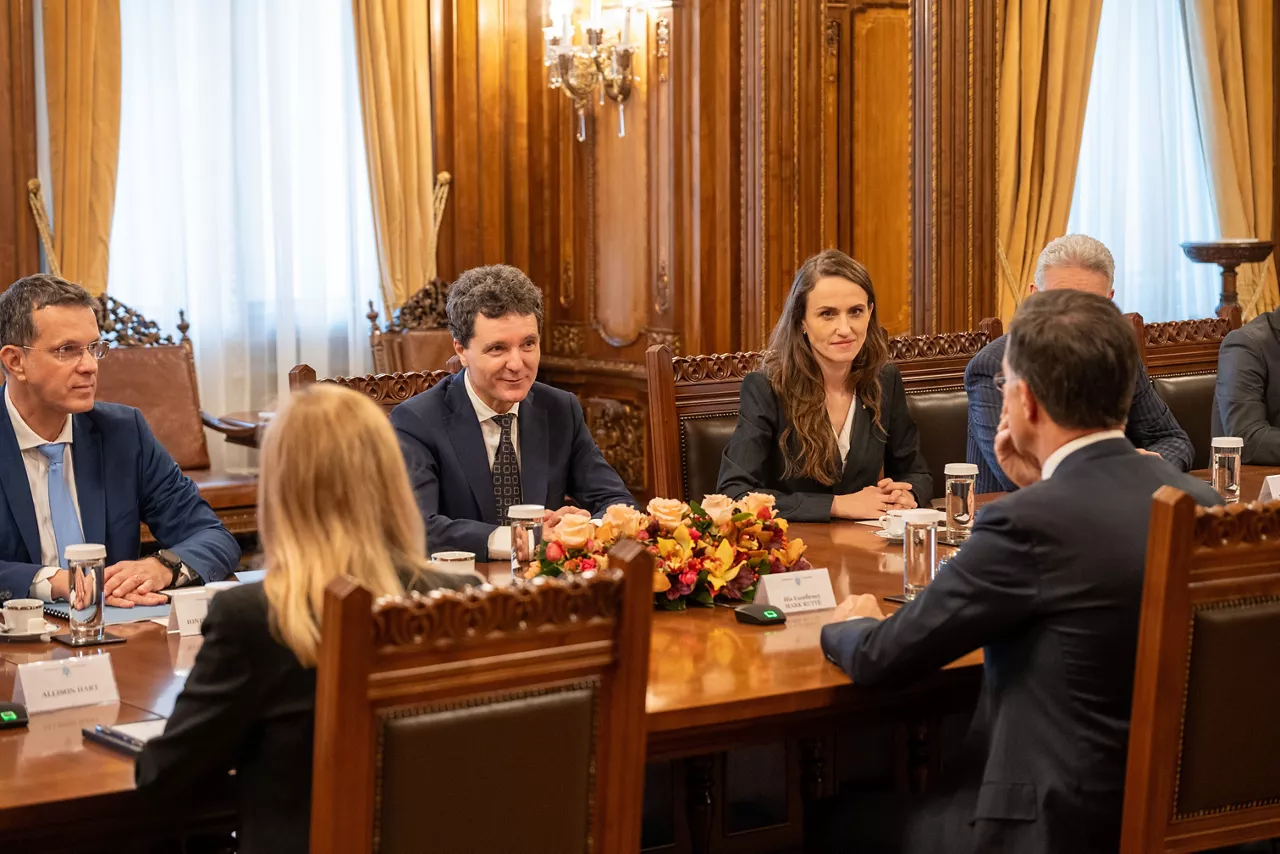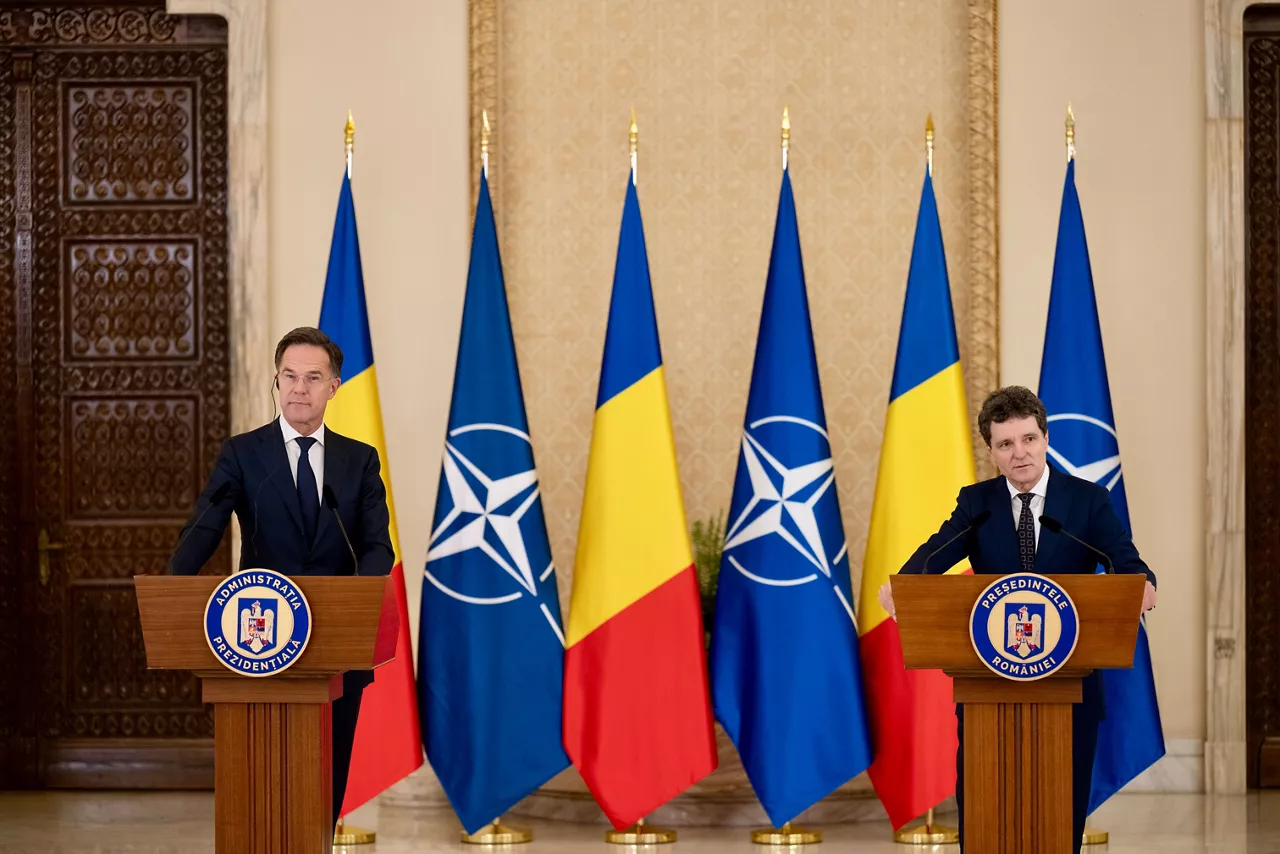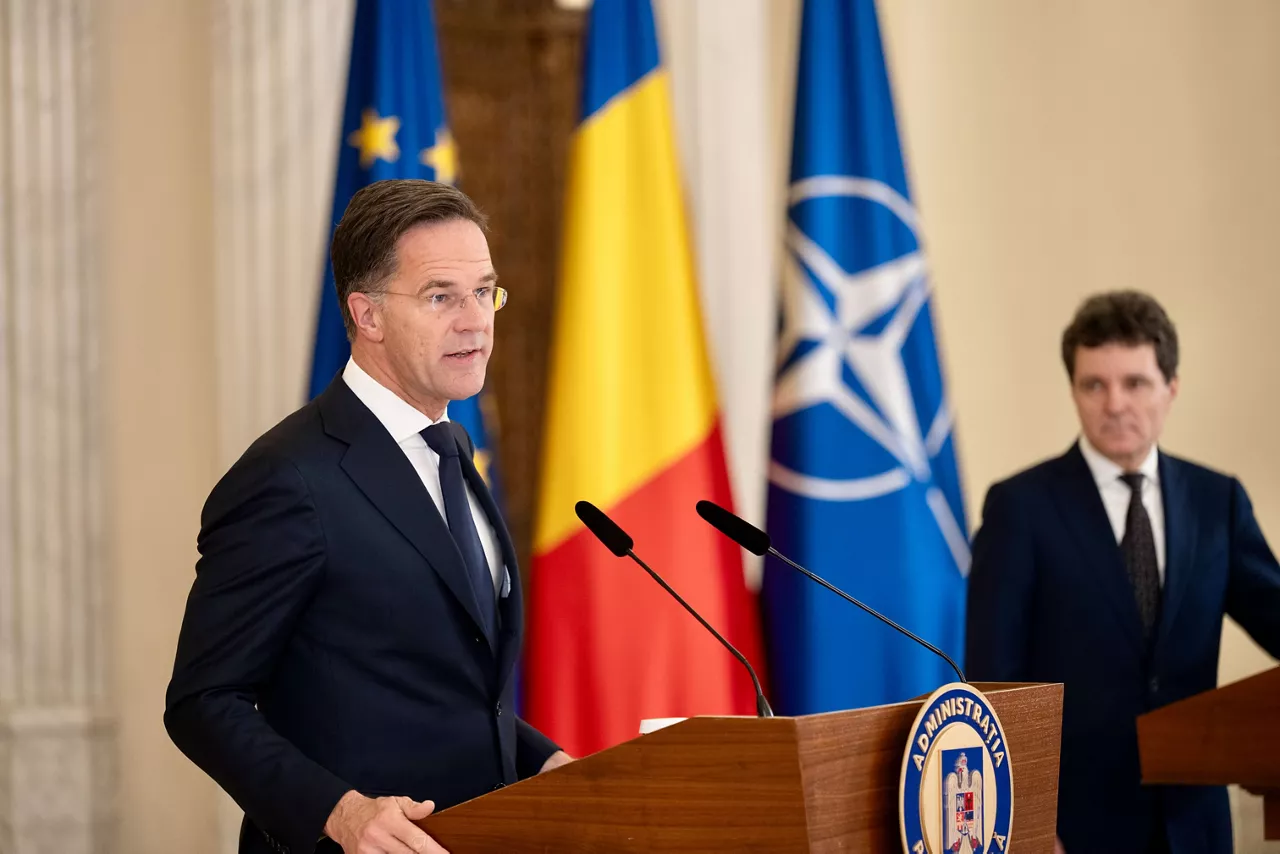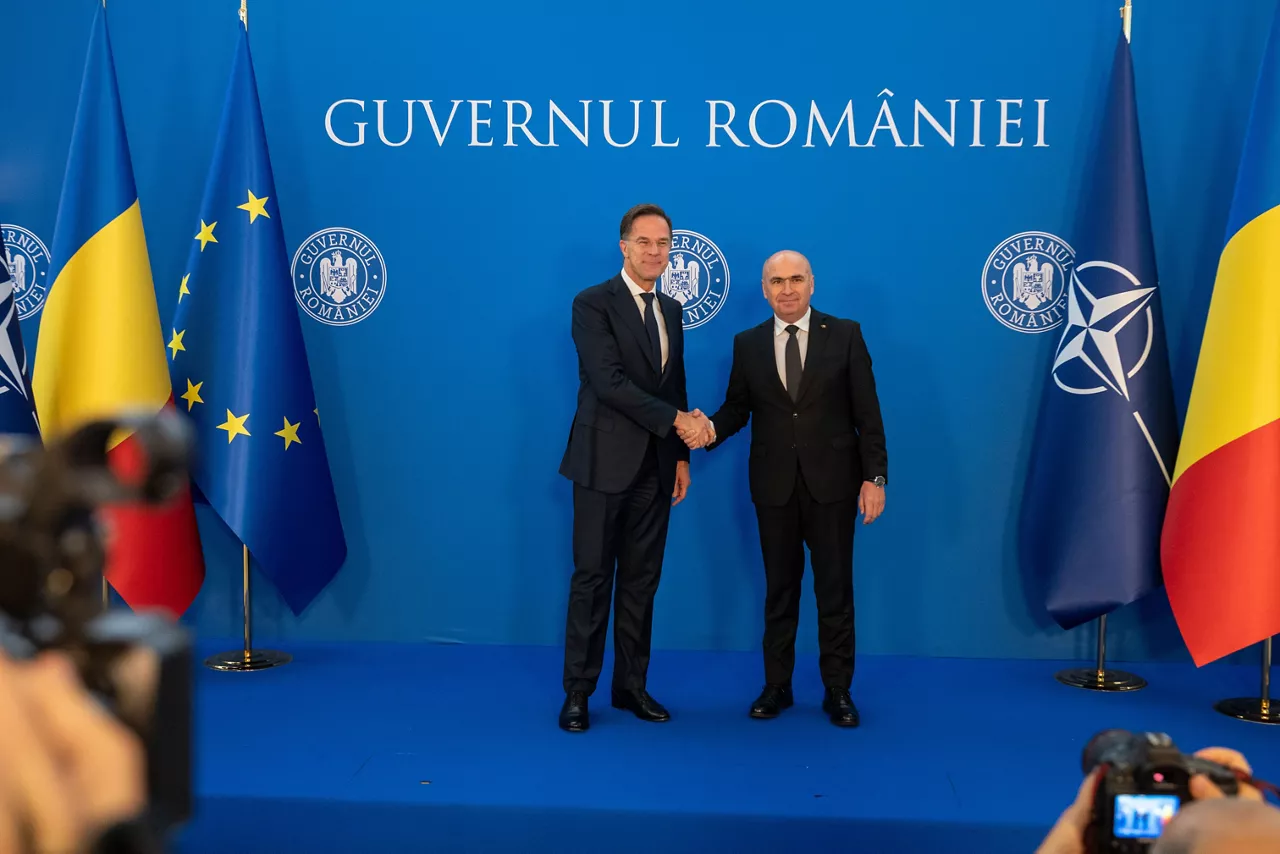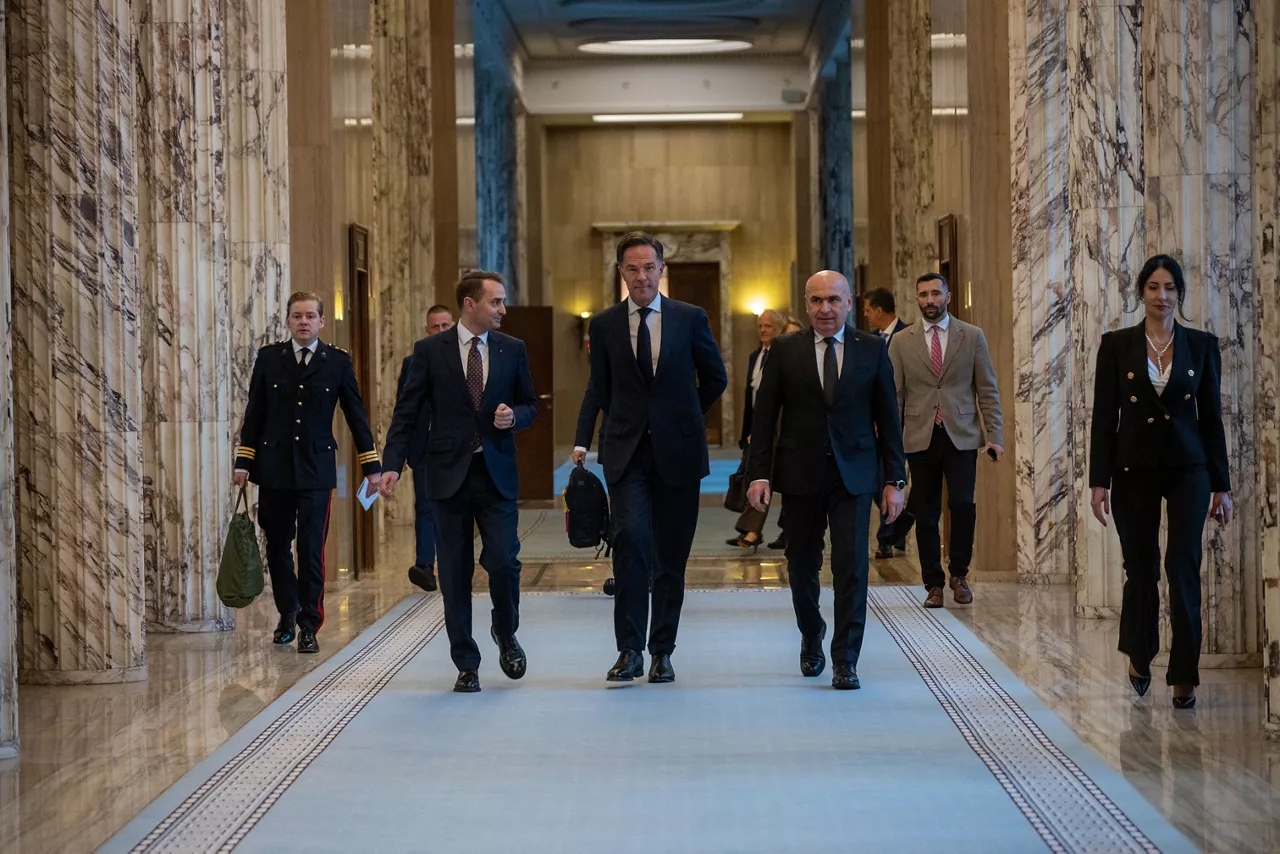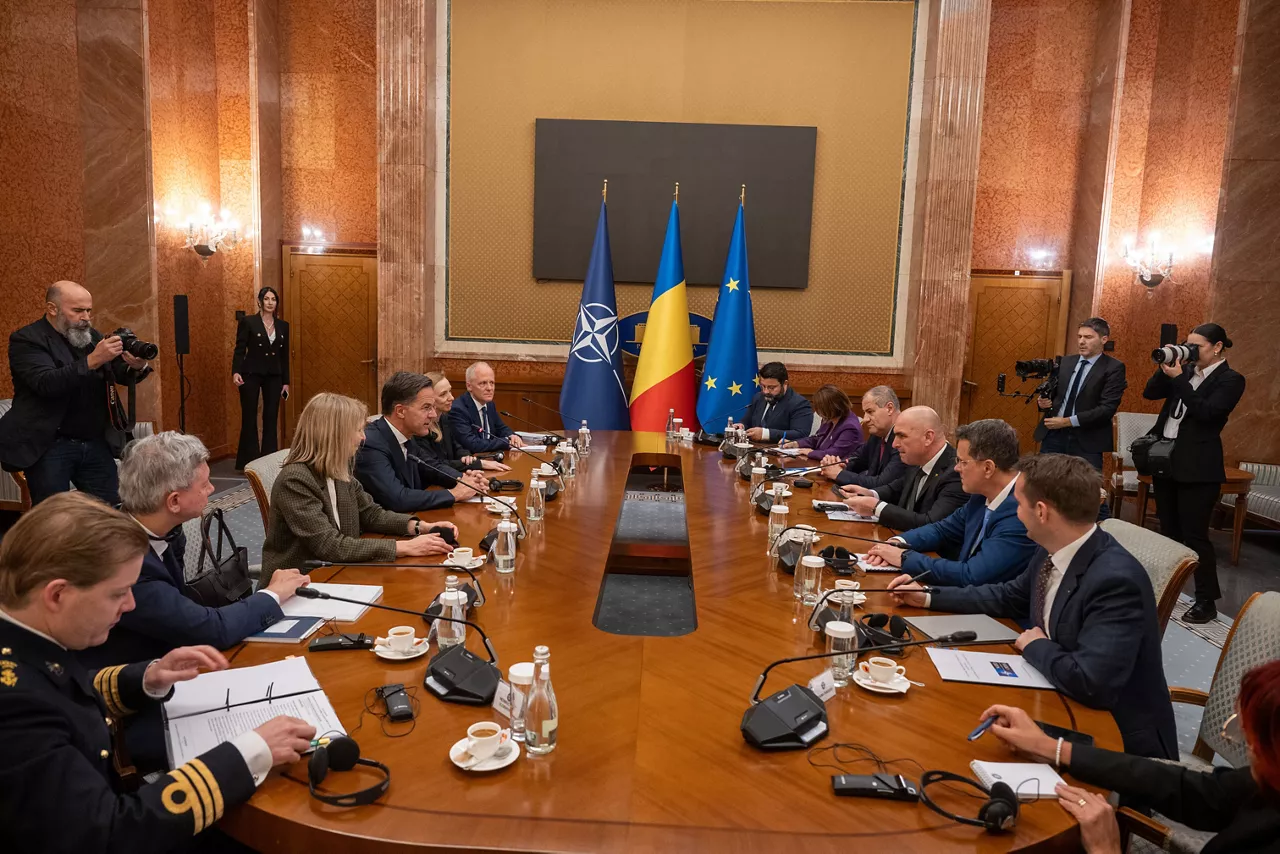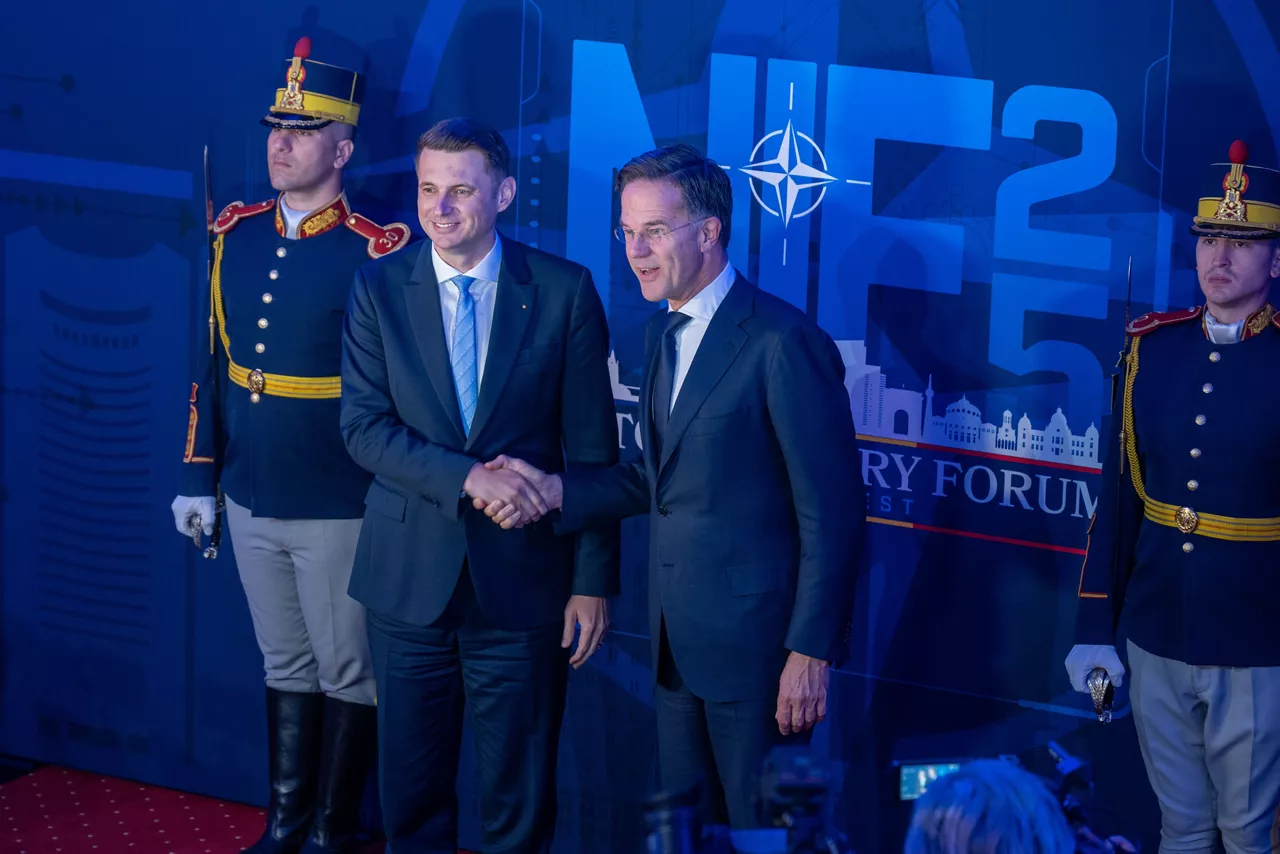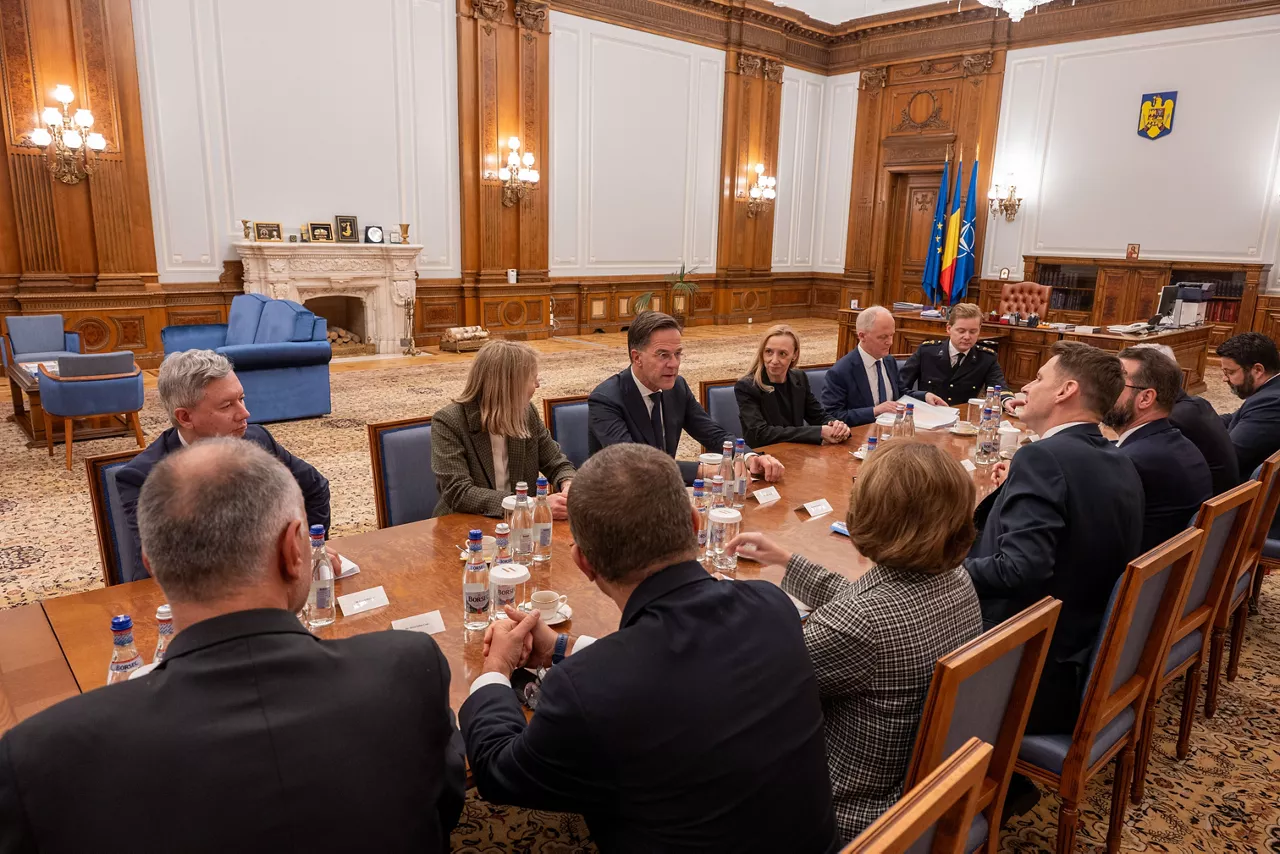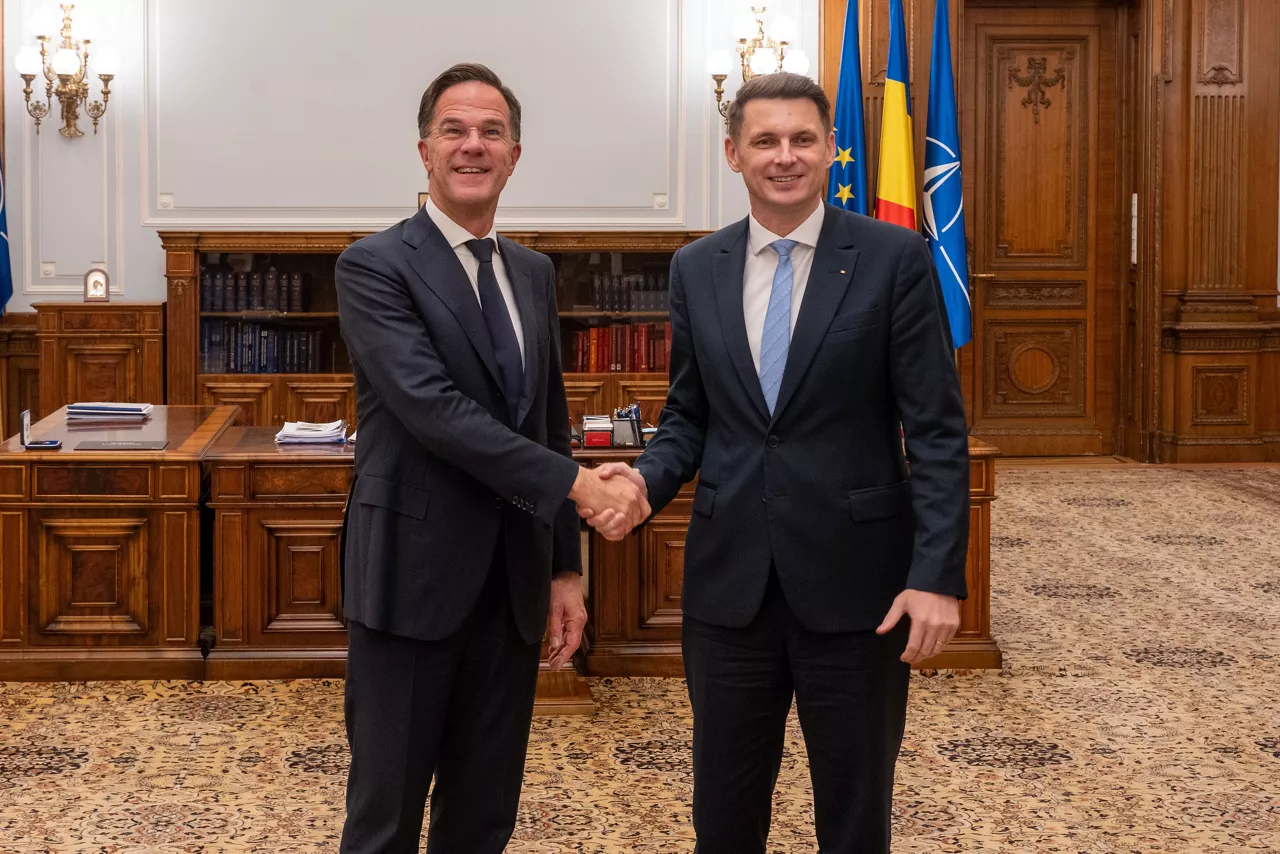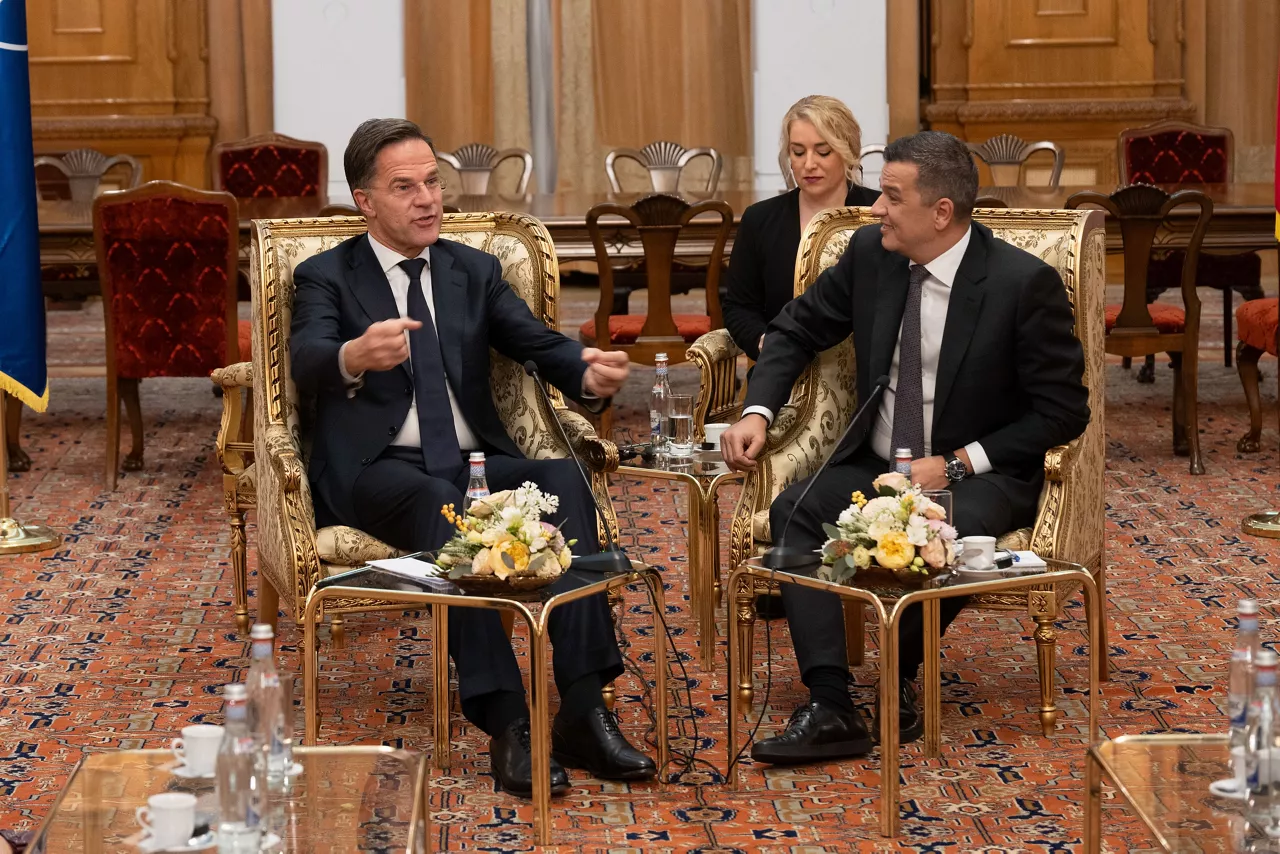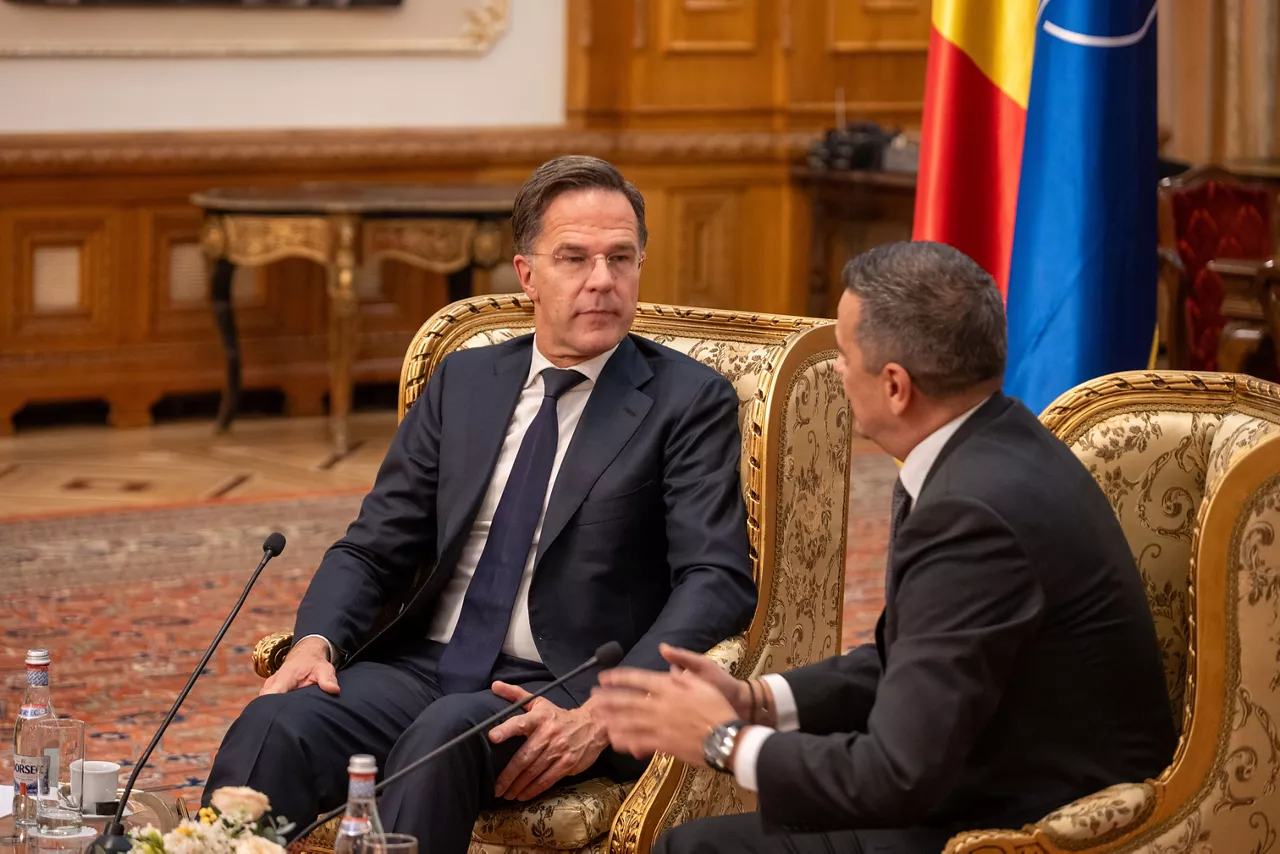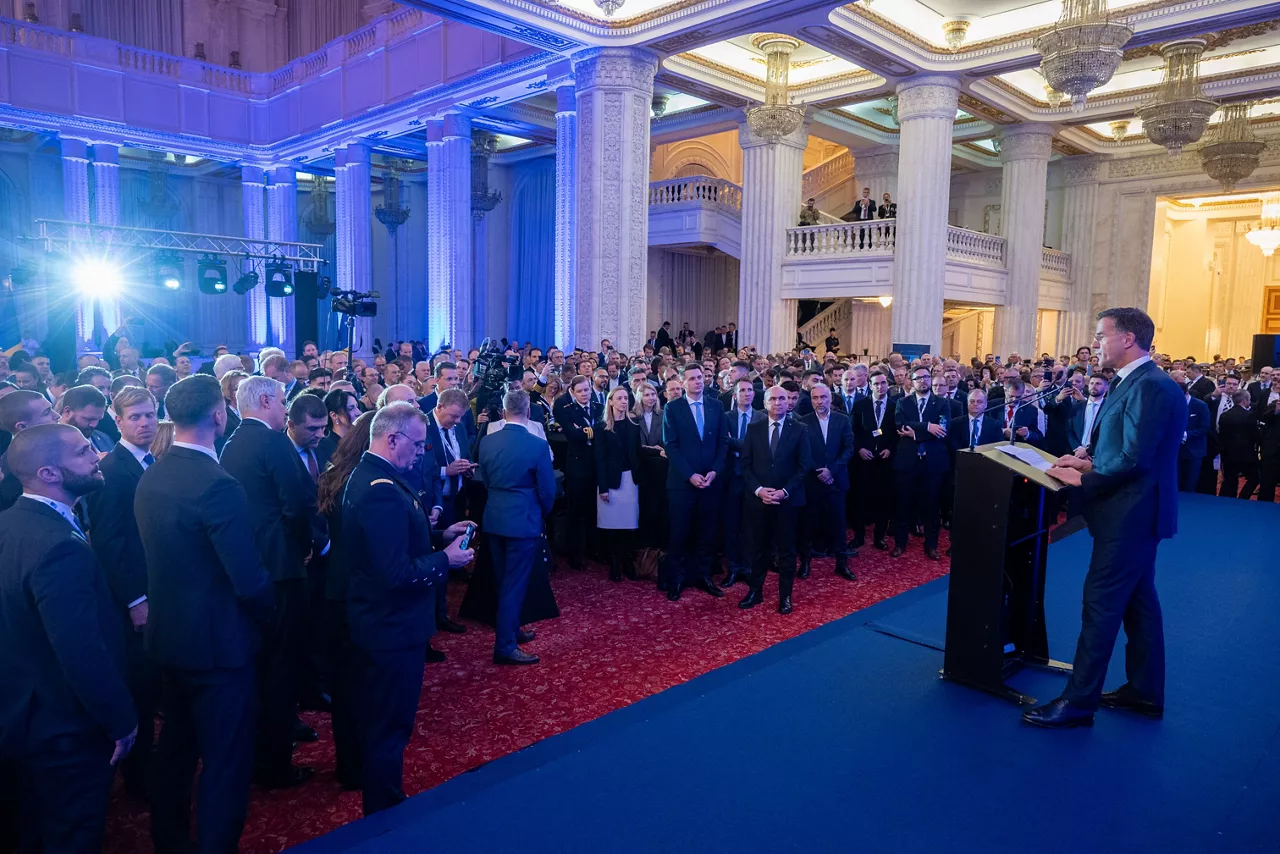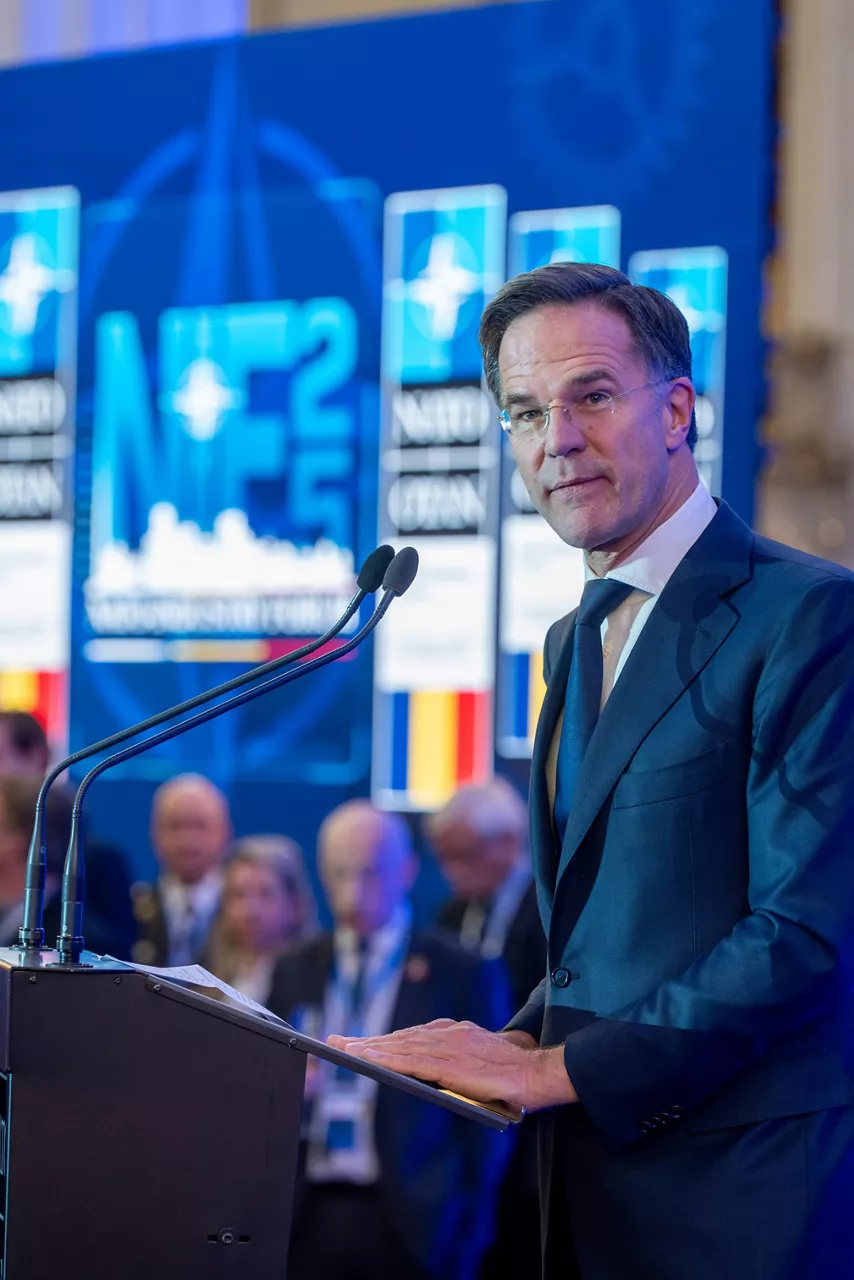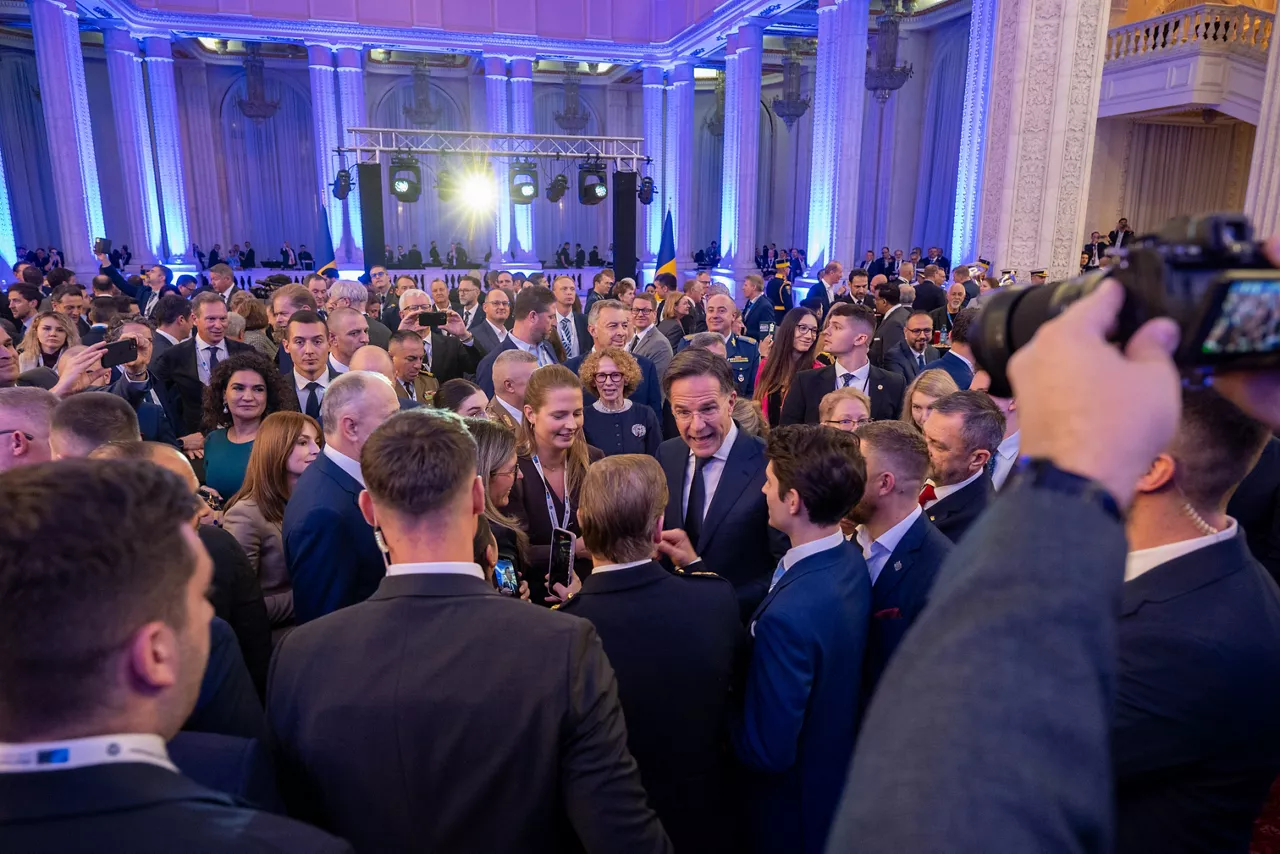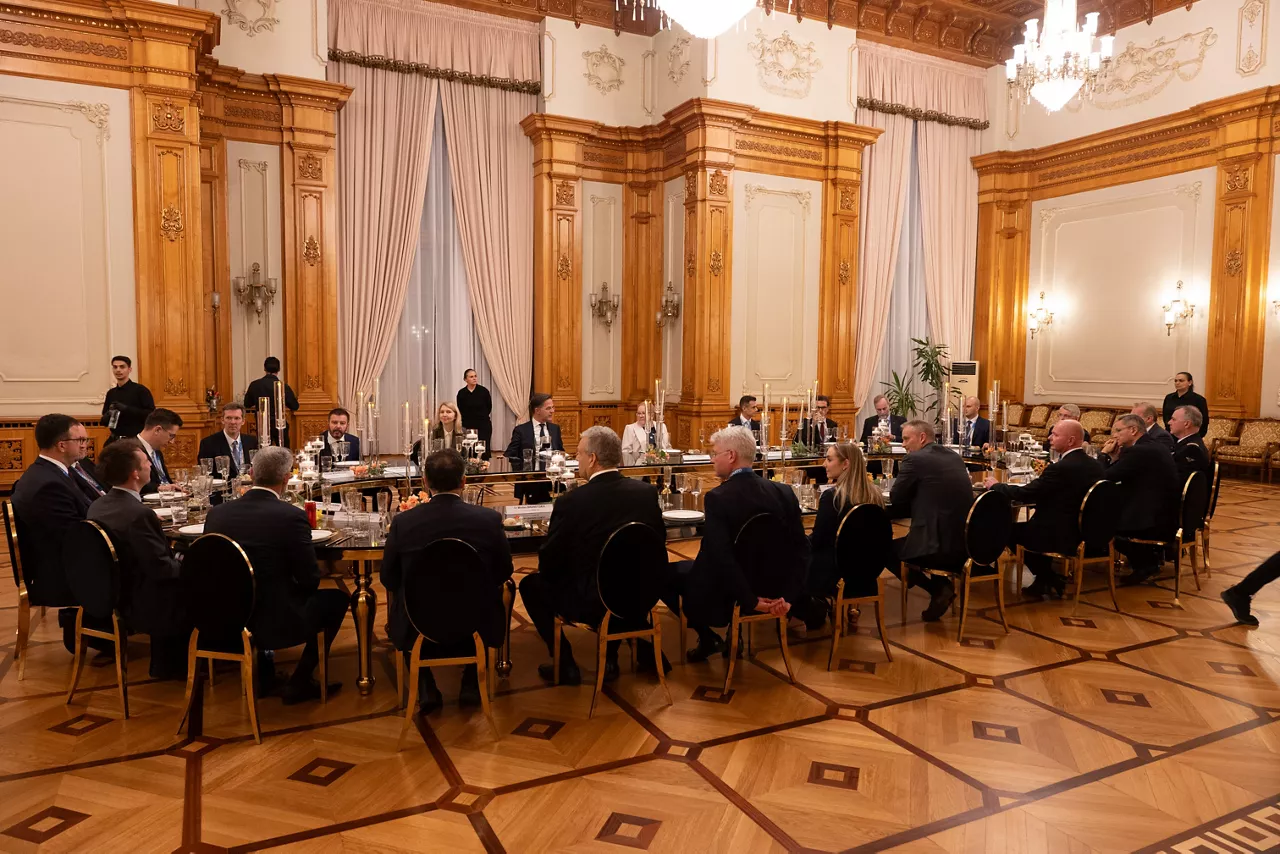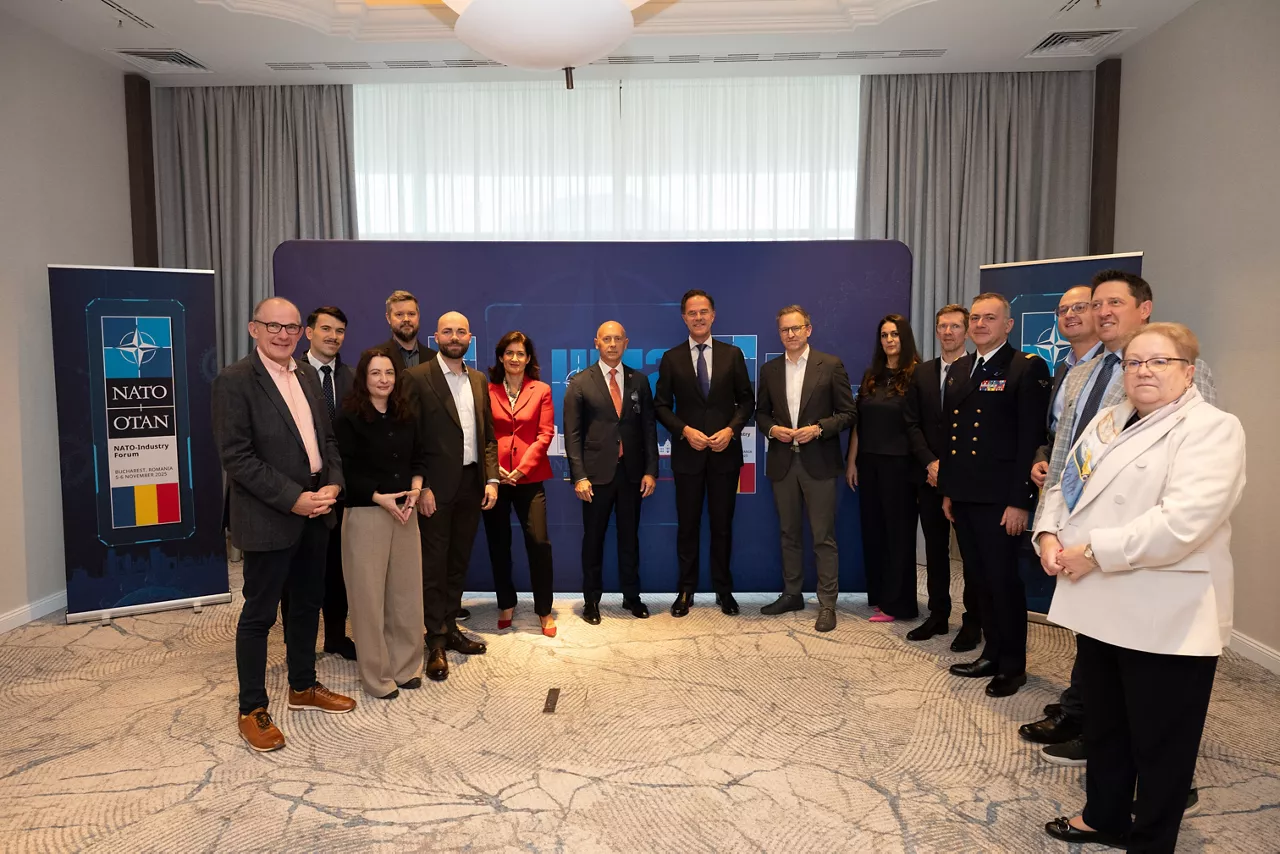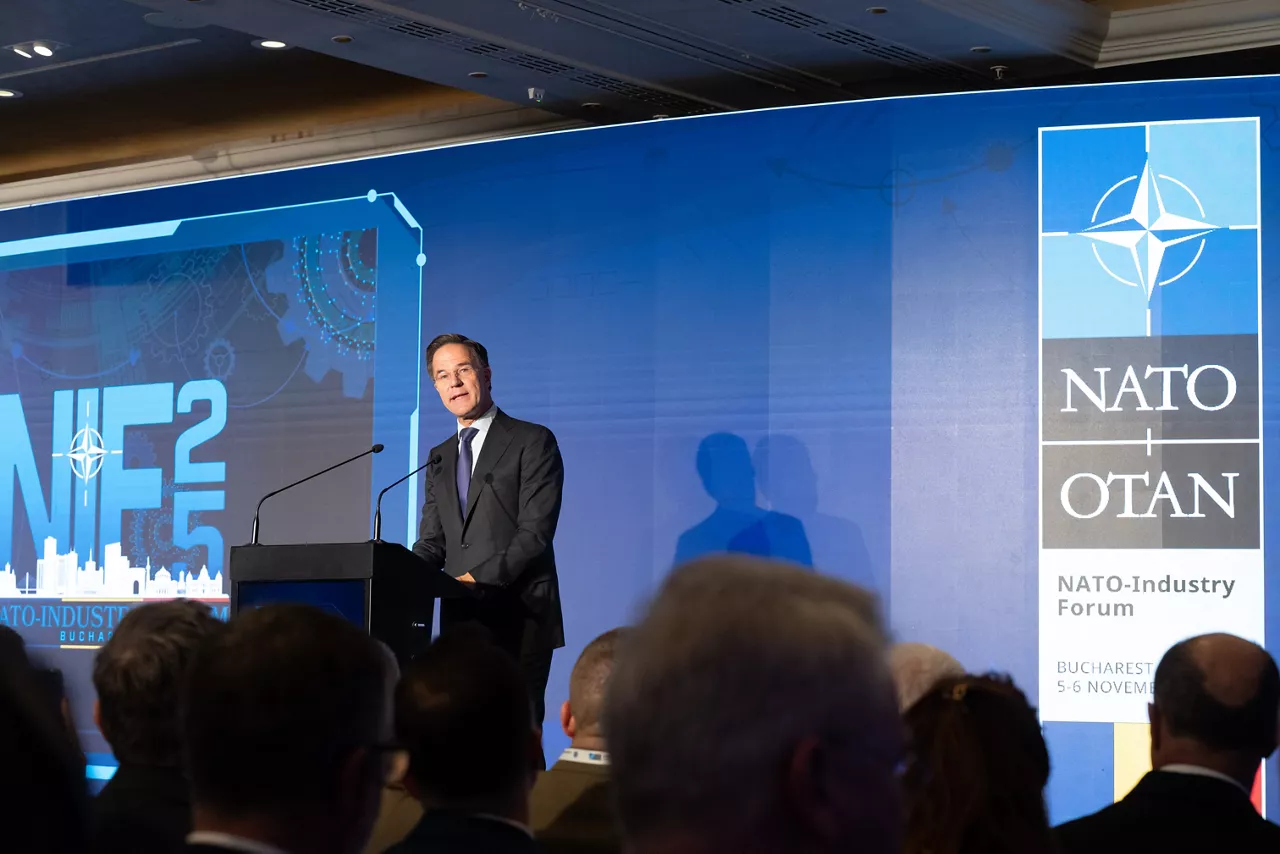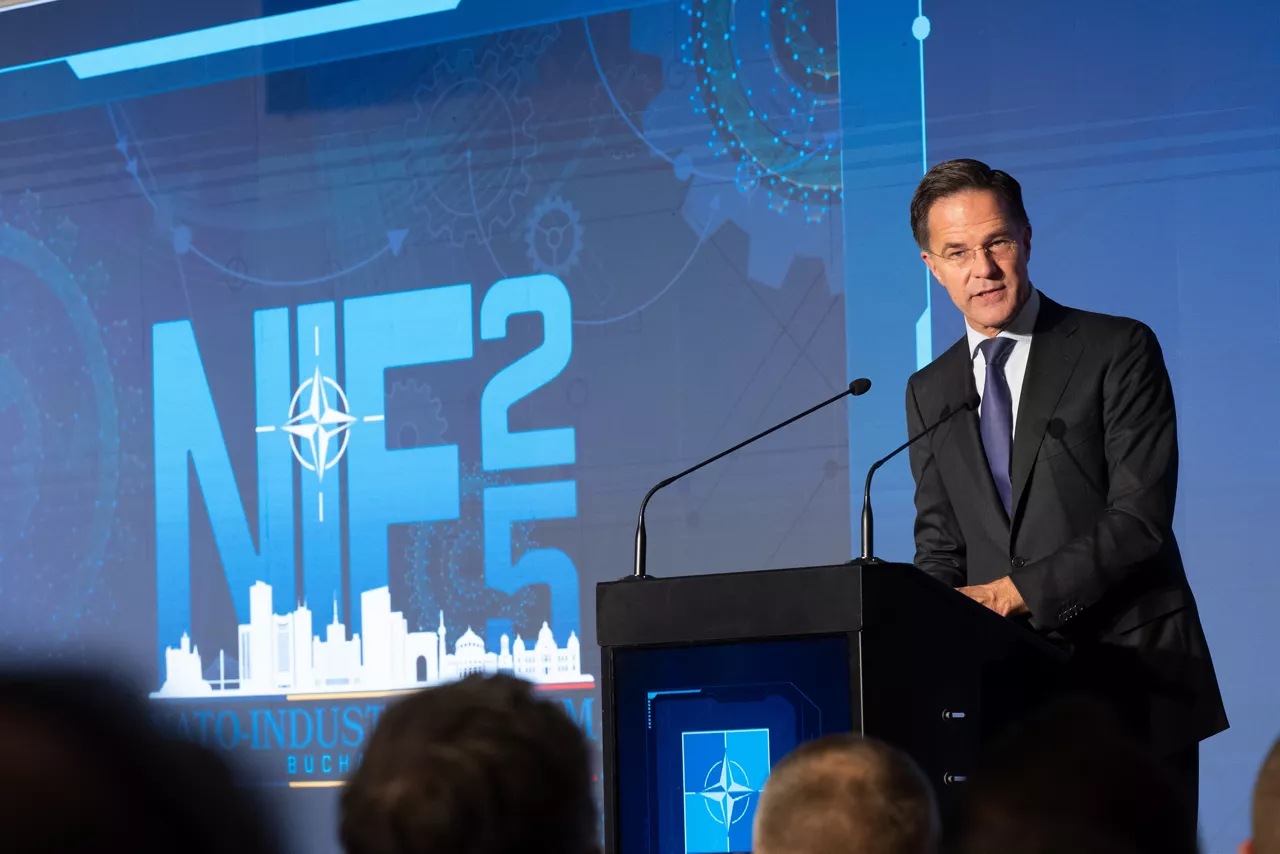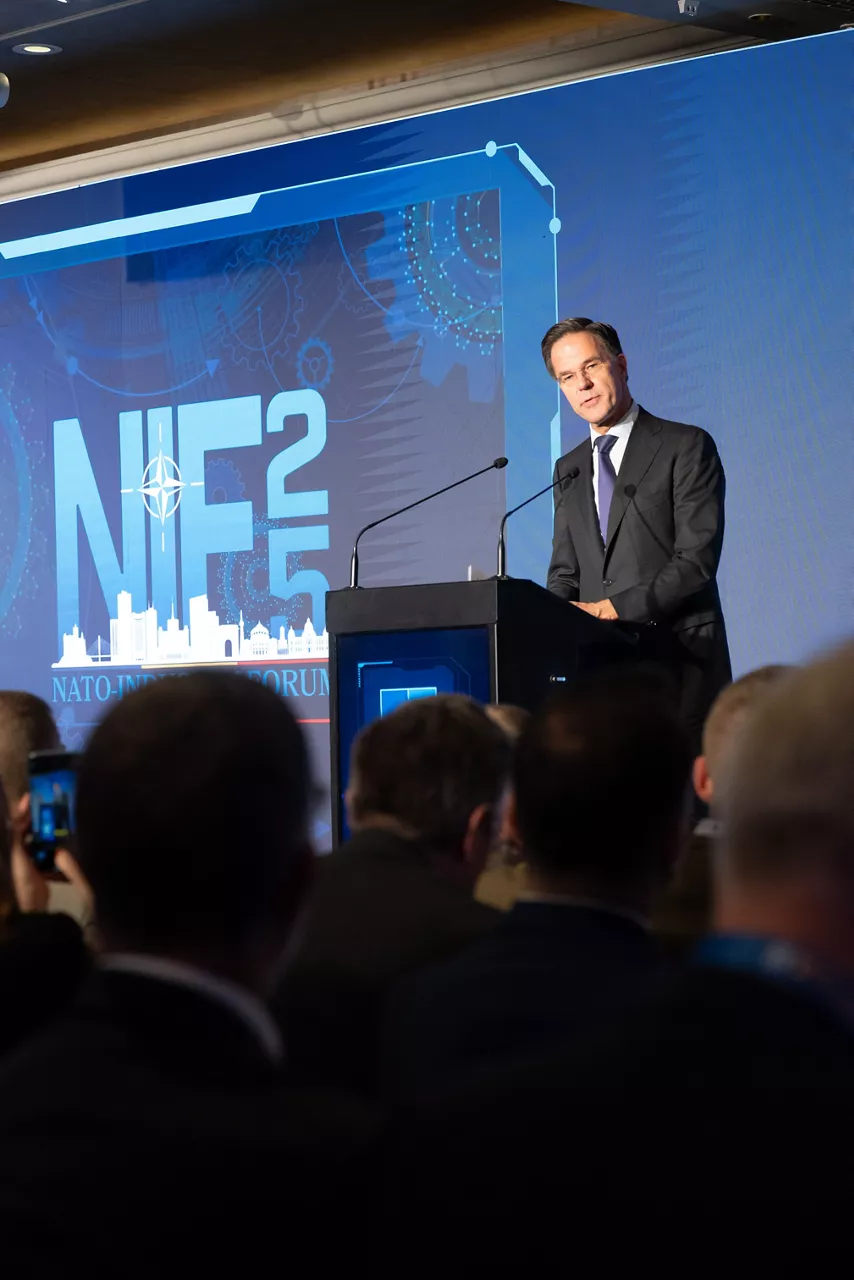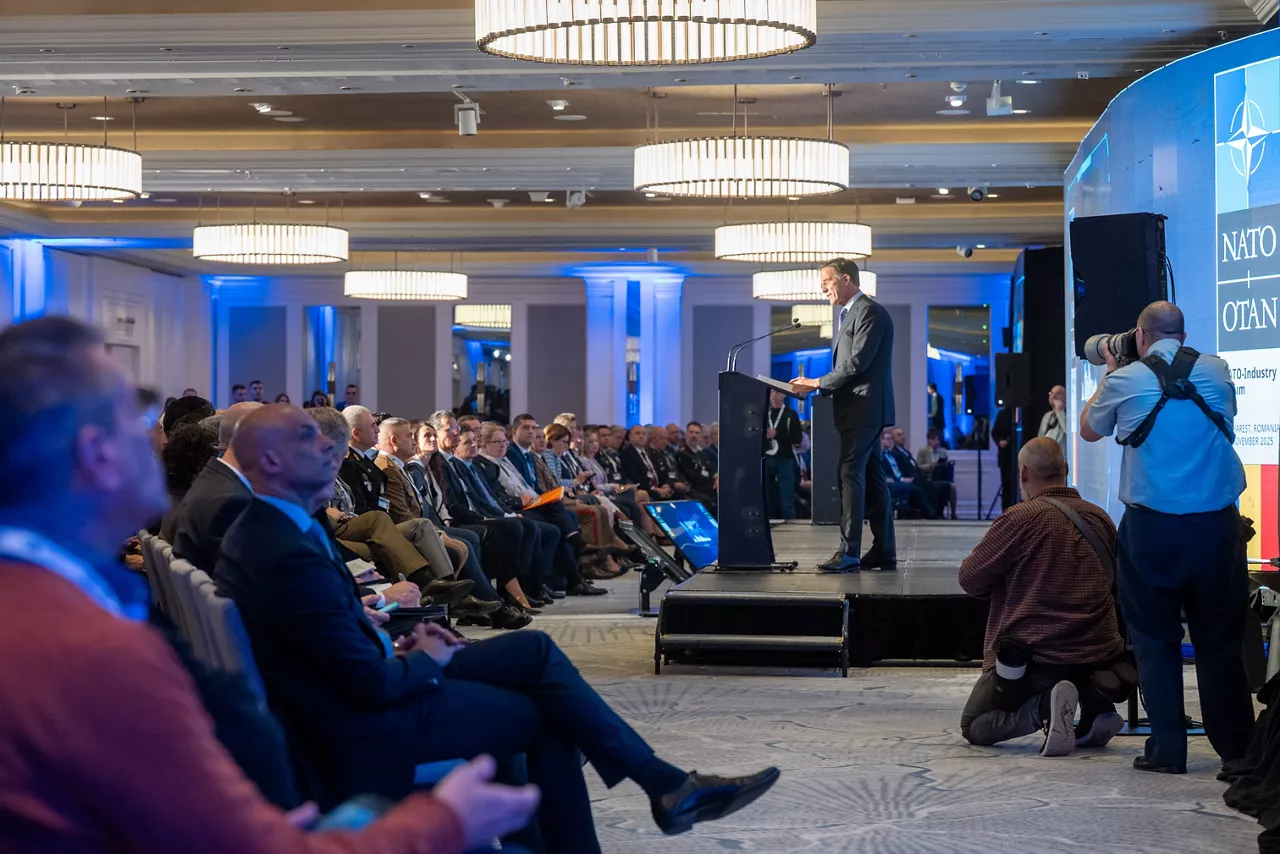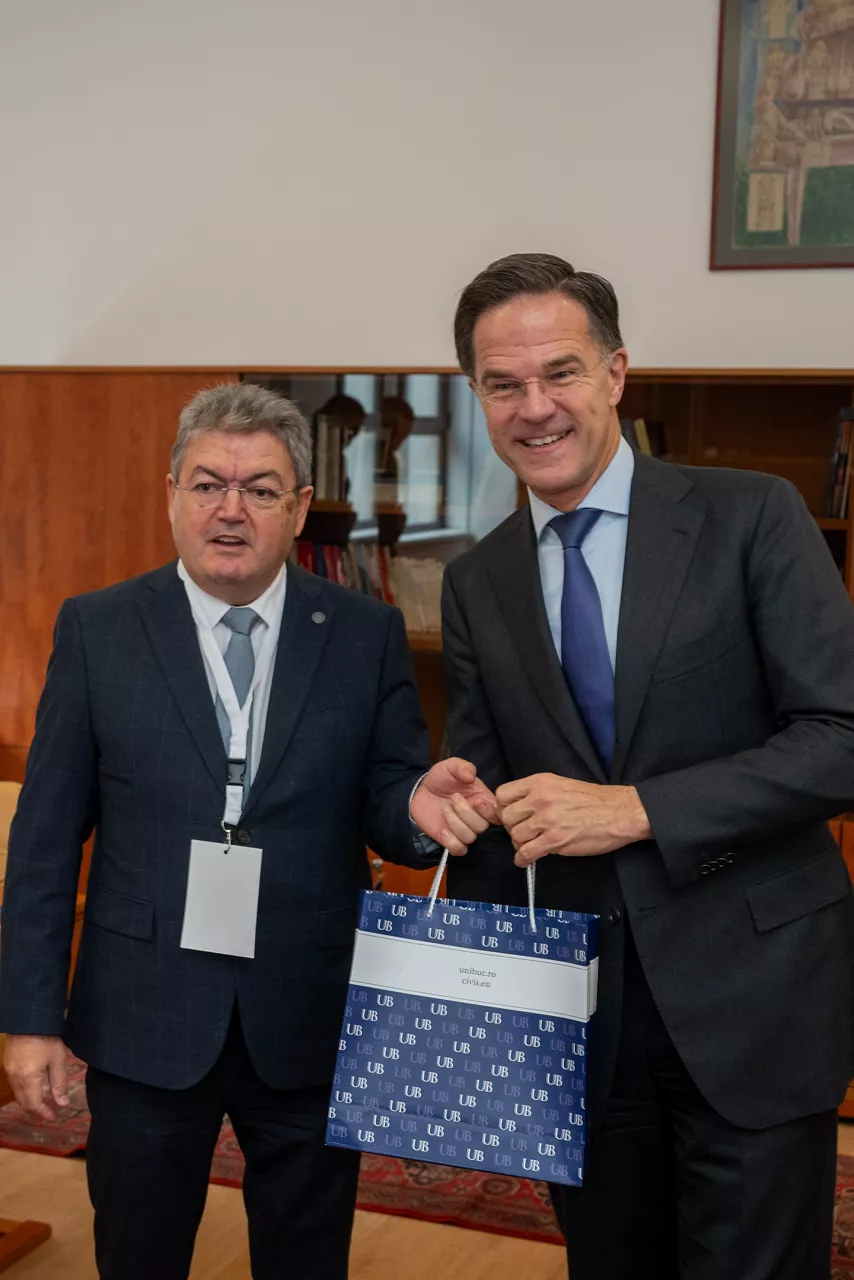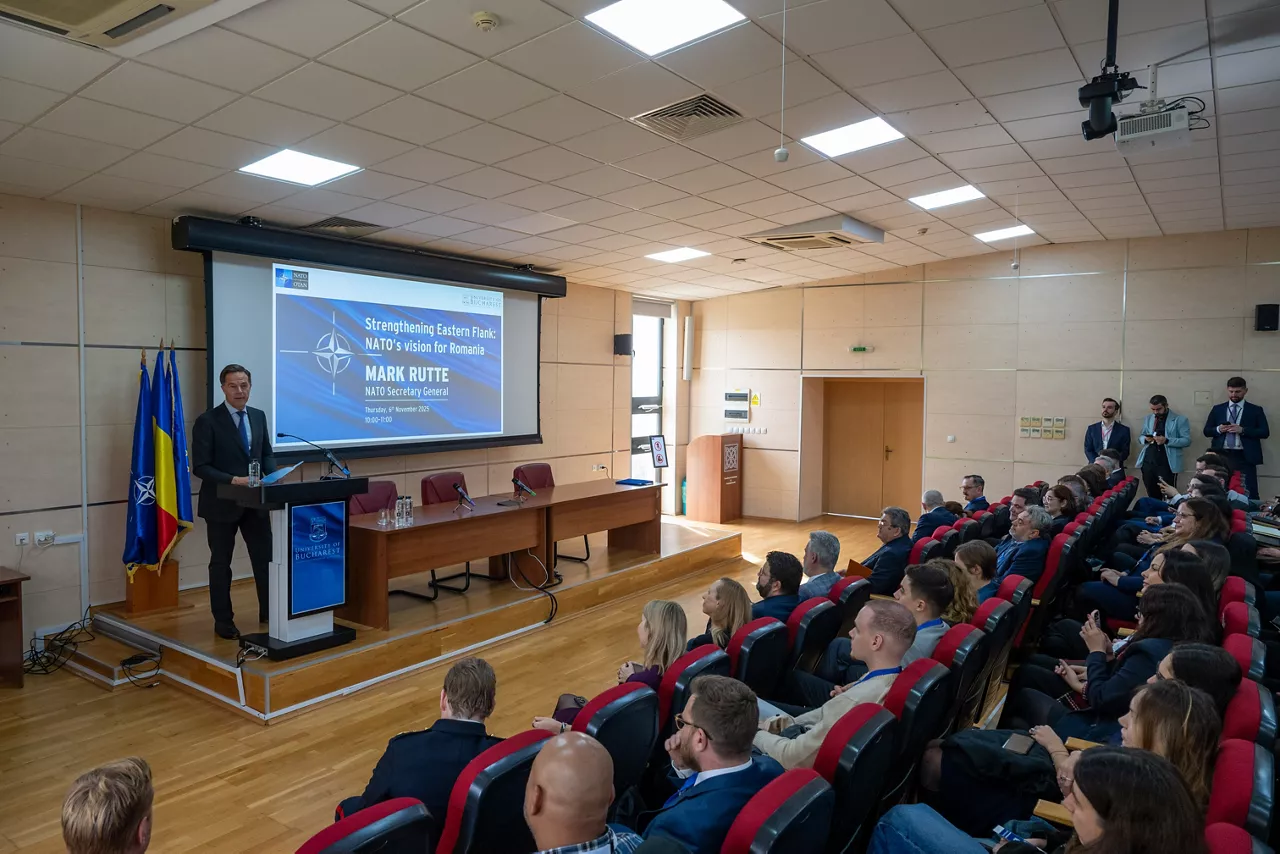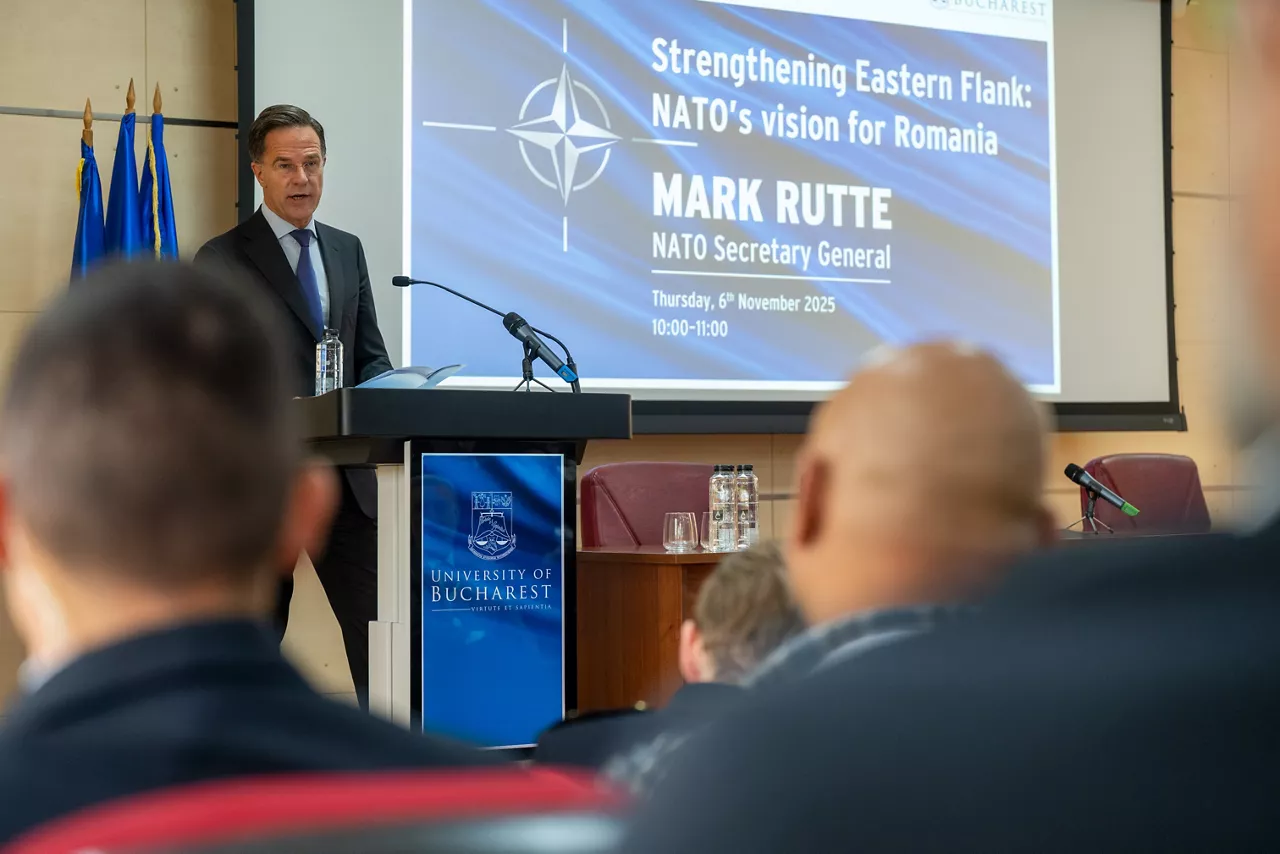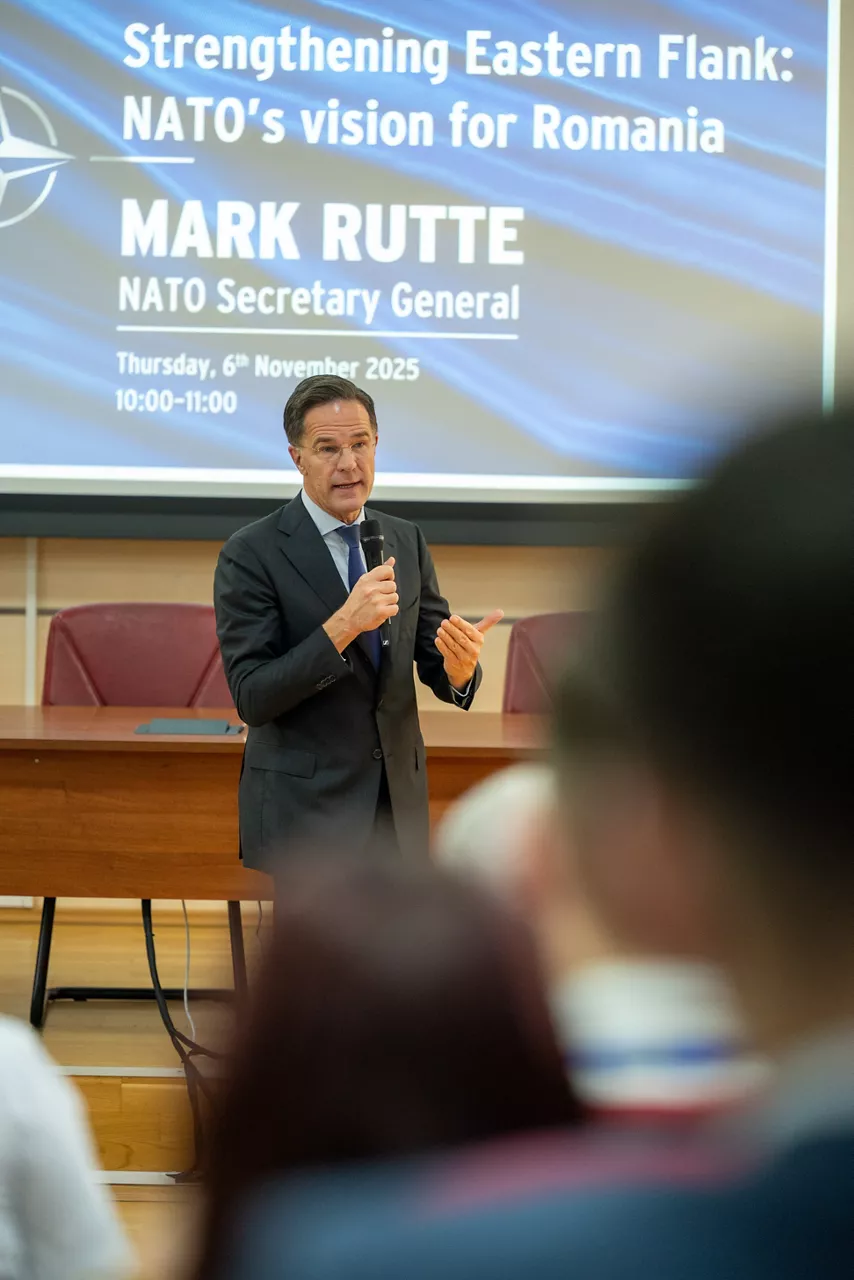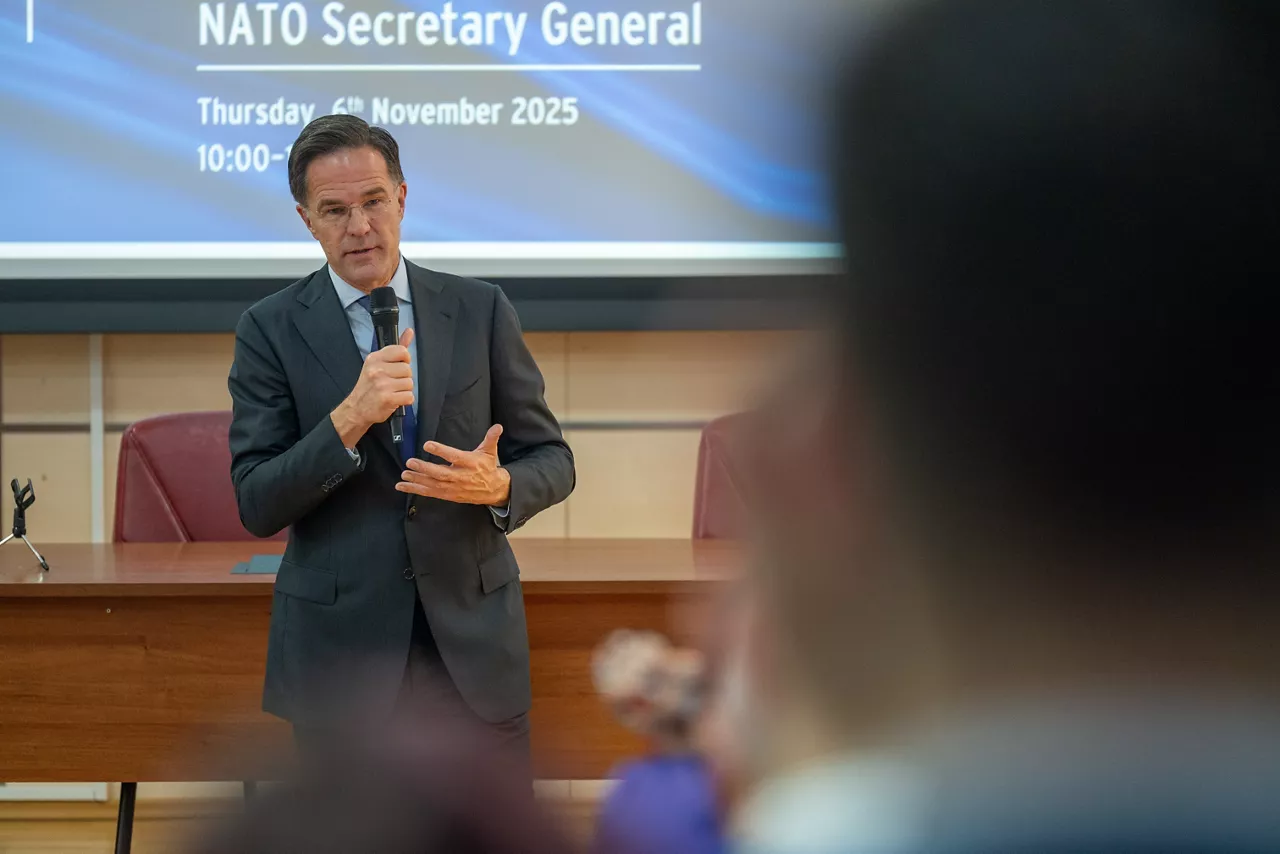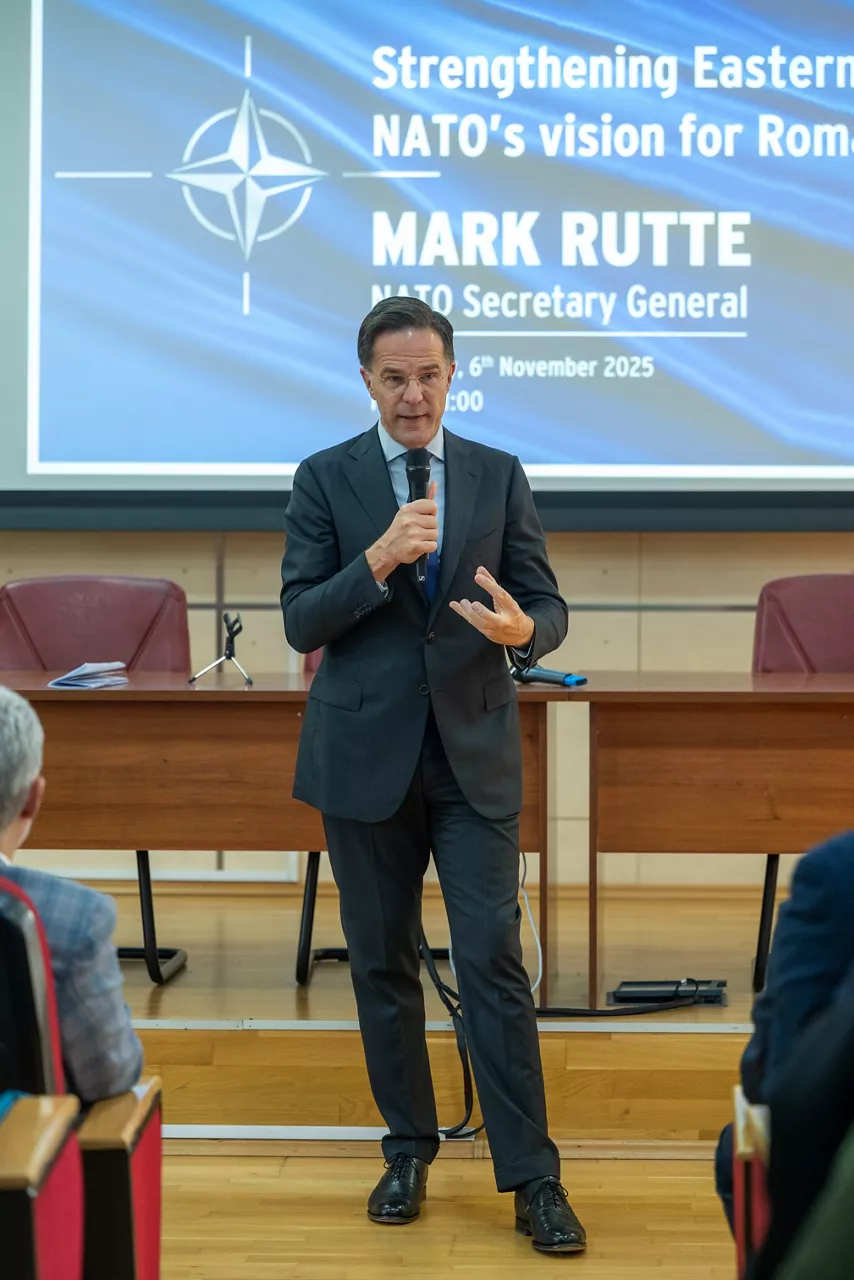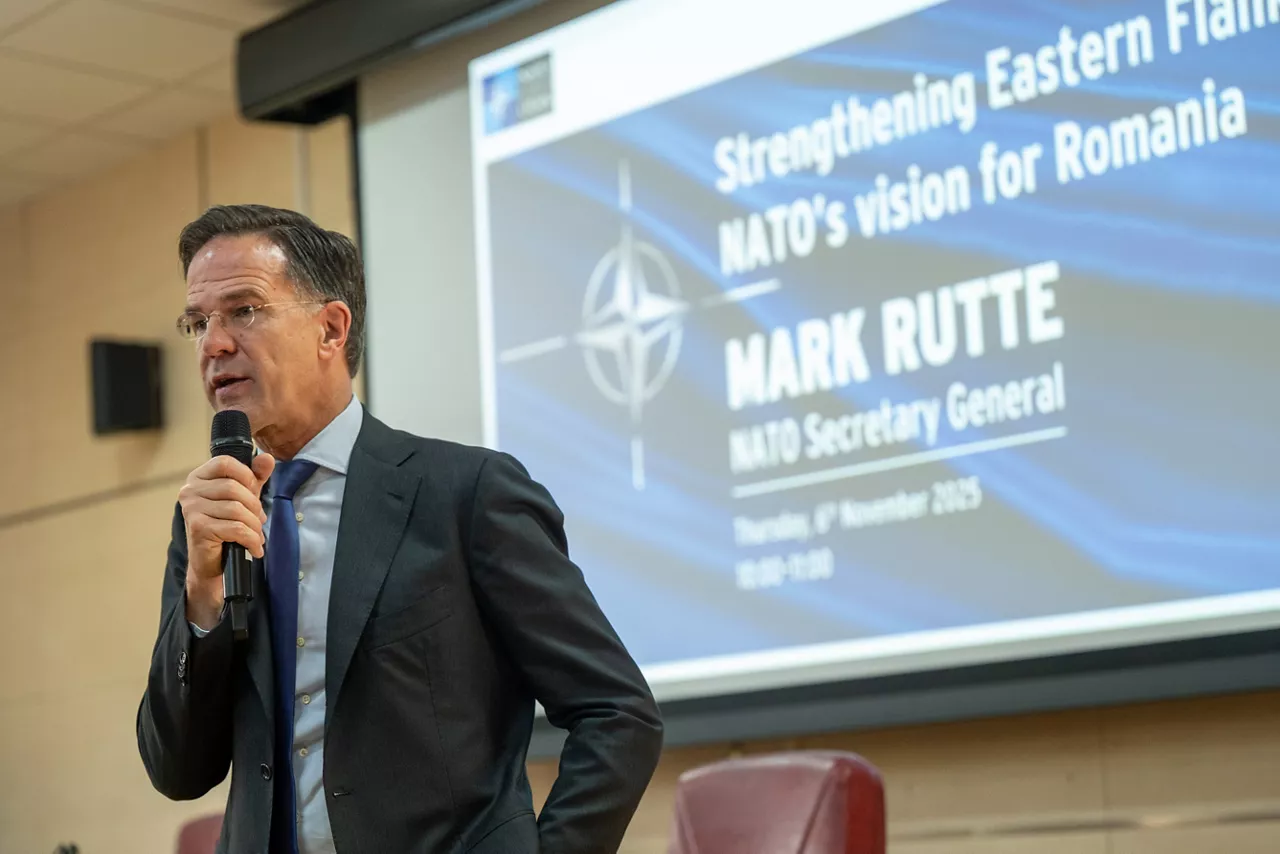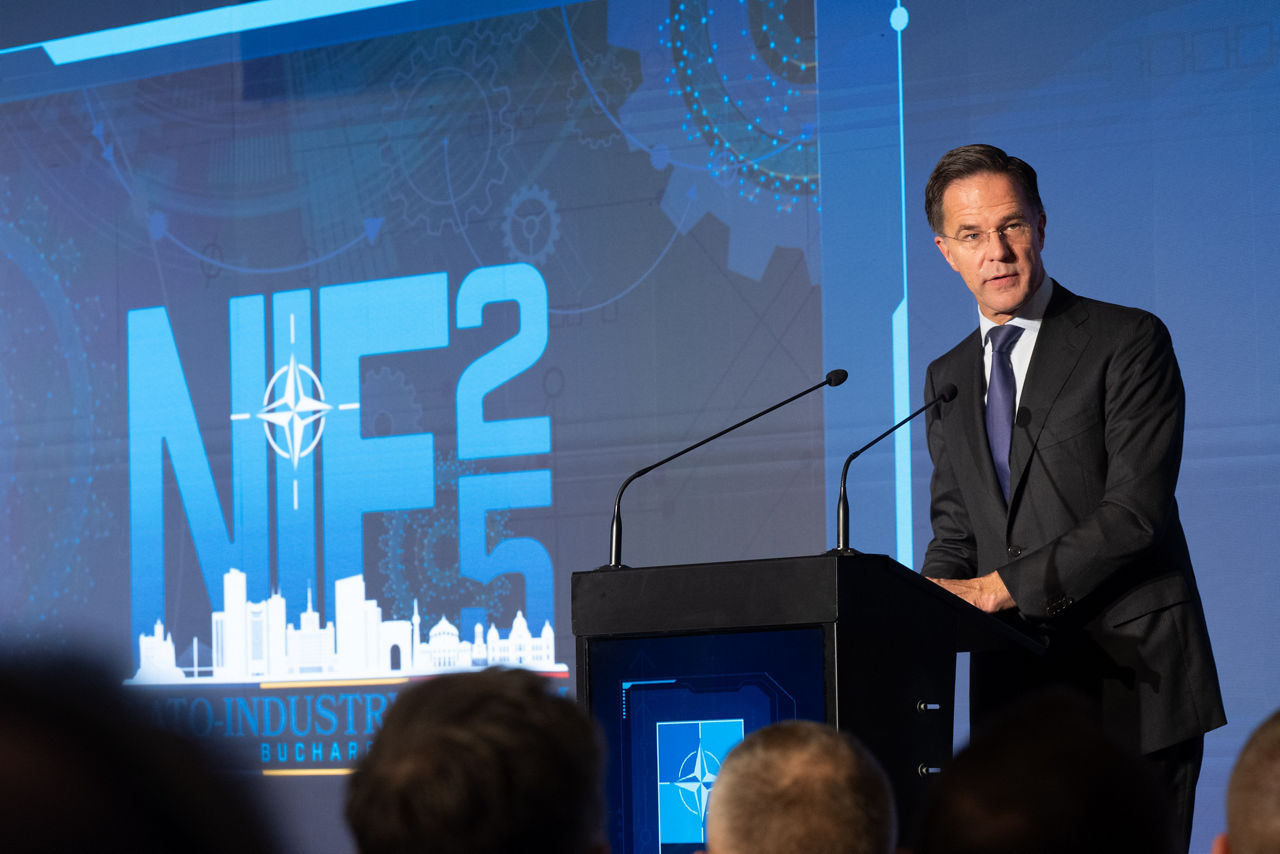Download NATO’s broadcast-quality video content free of charge

NATO MULTIMEDIA ACCOUNT
Access NATO’s broadcast-quality video content free of charge

Check your inbox and enter verification code
You have successfully created your account
From now on you can download videos from our website
Subscribe to our newsletter
If you would also like to subscribe to the newsletter and receive our latest updates, click on the button below.
Enter the email address you registered with and we will send you a code to reset your password.
Didn't receive a code? Send new Code
The password must be at least 12 characters long, no spaces, include upper/lowercase letters, numbers and symbols.
Your password has been updated
Click the button to return to the page you were on and log in with your new password.
Speech
by NATO Secretary General Mark Rutte at the NATO-Industry Forum in Bucharest, Romania
06 November 2025
6 MIN READ
(As delivered)
Thank you for that very kind introduction.
President Dan, dear Nicușor, Ministers, Excellencies, Ambassadors present here, Admiral Vandier, dear Pierre.
Ladies and gentlemen, good morning to you all. And first, let me thank you, President Dan and Romania for hosting us here in Bucharest and for your lovely evening yesterday.
And also, a special thanks to Pierre and Tarja and your respective teams at Allied Command Transformation and NATO headquarters for Co-organizing this forum. Thank you so much, and many thanks to all the industry executives for joining us. I'm really pleased to be here. This is such an impressive crowd.
I think this is, one of the biggest events in the context of industry and NATO we have ever organized. So, thank you all for being here.
You the business and industry executives in this room are the industrial component of our deterrence and defence.
And there simply is no strong defence without a strong defence industry. And sometimes it is that simple. Many of you were also in The Hague at the NATO summit and the NATO Summit Defence Industry Forum we organized in the context of the summit. I believe the whole Summit in the Hague, including what we organized in the context of industry, was historic. It was successful, and we took important decisions to make NATO much stronger. And the president already mentioned a few of them, because at that occasion, NATO leaders decided to invest 5% of GDP in defence by 2035.
5% and we all know that's serious money, that's serious spending, but it is what we need to stay safe. As part of this, leaders agreed to buy more defence capabilities, including jets, tanks, ships, but also drones, ammunition, cyber and space capabilities.
We are now turning these decisions into action, and for this, we need you. Your open dialogue between NATO and industry will be essential, as we deliver on these commitments. We are making progress; we would even say we are making good progress. There's more cash on the table, and even more will flow. European Allies and Canada are really stepping up, including Romania indeed, which has plans to increase the score defence spending to 3.5% by 2030. But of course, cash alone can't provide security. We need the capabilities, we need the equipment, real fire power, and of course, the most advanced tech. Because the threats we face are real and lasting. Russia's unprovoked war against Ukraine is the most obvious example of the threat.
But the danger posed by Russia will not end when this war does.
For the foreseeable future, Russia will remain a destabilizing force in Europe and the world.
And Russia is not alone in its efforts to undermine the global rules. As you know it is working with China, with North Korea, with Iran and others.
They are increasing their defence industrial collaboration to unprecedented levels. They are preparing for long term confrontation.
We cannot be naive. We must be prepared.
President Roosevelt famously said that “Powerful enemies must be out-fought and out-produced”. And that was in 1942 and the same can be said today.
We call it peace through strength. And NATO will do its part, and we need industry to do yours.
I am confident that together, we have what it takes to outgun, out produce and outsmart those that seek to harm or diminish us.
To do this well, we should focus on three key drivers, quantity, creativity and cooperation.
First on quantity, we already have state of the art systems, the best of the best. These give us an edge, and we will keep it sharp.
Which we need more and we need fast, and that means increasing production and shortening delivery times. We are already turning the tide on ammunition.
Until recently, Russia was producing more ammunition than all NATO Allies put together.
But not anymore. Across the Alliance, we are now opening dozens of new production lines and expanding existing ones. We are making more than we have done in decades. We need to build on this progress in other areas, from high end air defence and low-cost drone interceptors.
Here, quantity is key, and this brings me to the second driver, creativity. This is about the power of innovation.
To stay safe in the future, we need to outsmart our adversaries, drawing on all our strengths.
There are creative minds in this room I know, from large and established corporations to small startups. We need what you have to offer, and we live in free societies where your creativity can thrive. So, bring your ideas, put your ingenuity to the test, and use NATO as your test bed.
We have the Defence Innovation accelerator for the North Atlantic or DIANA, with a network of test centers and accelerator sites across NATO countries.
We also have the NATO Innovation Fund, the world's first multi sovereign venture capital fund.
Through this fund, we invest in deep tech, dual use technology startups that can support our defence, our resilience and our security, so we can help develop the next generation of innovators.
The third driver I want to talk about is cooperation.
This is NATO's bread and butter. It's also the reason for this NATO industry Forum, bringing together the ideas, the assets, the industry of 32 countries across Europe and North America is powerful. And there's even more we can do when we work with our partners, including European Union, Ukraine and countries in the Indo Pacific region, like Australia, Japan, New Zealand and the Republic of Korea.
We have so much to learn from each other, and by combining our efforts, we can produce more and increase innovation. It benefits us all.
Dangerous times call for bold action and this demands a degree of risk tolerance from all of us. As leaders, take the political risk, industry is being asked to take some business risk. As you think of your shareholders, this may make you nervous.
You are waiting for governments to sign long term contracts. I know, and you're right. Sometimes governments need to do that, but I can tell you that when it comes to investing more in our defence, the political will is there. You heard the President. You know the decisions we took in the Hague, the political will is there, the money is there, the demand is there, and our security depends on it.
So as you're business leaders, perhaps we can make a deal.
On my end, I will continue to do all I can to urge governments to walk the talk and sign the contracts, and I promise we will do all we can from NATO to expedite procurement and keep supporting innovation.
Tarja, Pierre, you are with me on this, I know. But in exchange, you need to be ready. Step up supply, expand existing production lines and open new ones.
Don't let the fear of future surplus capacity keep you from meeting the real needs we face today. I have every confidence that what you produce will be purchased.
There are great business opportunities for all of you, and real benefits for us all, because when industry steps up supply, the result is not only more security, also more economic growth and many more jobs.
The defence dividend is real, and our mission couldn't be more worthy.
So, let's work together to deliver a safer and more prosperous future for us all.
Thank you very much.
Related assets
GALLERIES
NATO Secretary General visits Romania
05 November 2025 - 06 November 2025
NATO Secretary General Mark Rutte arrives in Bucharest - Welcome by Dan Neculăescu, Permanent Representative of Romania to NATO
NATO Secretary General Mark Rutte arrives in Bucharest - Welcome by Dan Neculăescu, Permanent Representative of Romania to NATO
NATO Secretary General Mark Rutte meets with Nicușor Dan, President of Romania
NATO Secretary General Mark Rutte meets with Nicușor Dan, President of Romania
NATO Secretary General Mark Rutte meets with Nicușor Dan, President of Romania
NATO Secretary General Mark Rutte meets with Nicușor Dan, President of Romania
NATO Secretary General Mark Rutte meets with Nicușor Dan, President of Romania
NATO Secretary General Mark Rutte meets with Nicușor Dan, President of Romania
Joint press conference by the NATO Secretary General Mark Rutte with Nicușor Dan, President of Romania
Joint press conference by the NATO Secretary General Mark Rutte with Nicușor Dan, President of Romania
NATO Secretary General Mark Rutte meets with Ilie Bolojan, Prime Minister of Romania
NATO Secretary General Mark Rutte meets with Ilie Bolojan, Prime Minister of Romania
NATO Secretary General Mark Rutte meets with Ilie Bolojan, Prime Minister of Romania
NATO Secretary General Mark Rutte meets with Mircea Abrudean, President of the Senate
NATO Secretary General Mark Rutte meets with Mircea Abrudean, President of the Senate
NATO Secretary General Mark Rutte meets with Mircea Abrudean, President of the Senate
NATO Secretary General Mark Rutte meets with Sorin Grindeanu, President of the Chamber of Deputies
NATO Secretary General Mark Rutte meets with Sorin Grindeanu, President of the Chamber of Deputies
Opening remarks by NATO Secretary General Mark Rutte at the reception of the NATO Industry Forum
Opening remarks by NATO Secretary General Mark Rutte at the reception of the NATO Industry Forum
NATO Secretary General Mark Rutte at the reception of the NATO Industry Forum
NATO Secretary General Mark Rutte hosts a dinner with CEO's of Allied Defence Industry companies
NATO Secretary General Mark Rutte meets with CEO's at the NATO Industry Forum
Remarks by NATO Secretary General Mark Rutte at the NATO-Industry Forum
Remarks by NATO Secretary General Mark Rutte at the NATO-Industry Forum
Remarks by NATO Secretary General Mark Rutte at the NATO-Industry Forum
Remarks by NATO Secretary General Mark Rutte at the NATO-Industry Forum
NATO Secretary General Mark Rutte visits Bucharest University and engages with students
NATO Secretary General Mark Rutte visits Bucharest University and engages with students
NATO Secretary General Mark Rutte visits Bucharest University and engages with students
NATO Secretary General Mark Rutte visits Bucharest University and engages with students
NATO Secretary General Mark Rutte visits Bucharest University and engages with students
NATO Secretary General Mark Rutte visits Bucharest University and engages with students
NATO Secretary General Mark Rutte visits Bucharest University and engages with students
GALLERIES
NATO Secretary General visits Romania





NATO Secretary General visits Romania
NATO Secretary General meets with the Prime Minister of Romania
Usage rights
CLOSE
This media asset is free for editorial broadcast, print, online and radio use. It is restricted for use for other purposes.
NATO Secretary General visits Romania
NATO Secretary General meets with the President of Romania
Usage rights
CLOSE
This media asset is free for editorial broadcast, print, online and radio use. It is restricted for use for other purposes.
NATO Secretary General visits Romania
Joint press conference by NATO Secretary General and the President of Romania (opening remarks)
Usage rights
CLOSE
This media asset is free for editorial broadcast, print, online and radio use. It is restricted for use for other purposes.
NATO Secretary General visits Romania
Joint press conference by NATO Secretary General and the President of Romania (Q&A)
Usage rights
CLOSE
This media asset is free for editorial broadcast, print, online and radio use. It is restricted for use for other purposes.
NATO Secretary General visits Romania
Speech by the NATO Secretary General at the NATO-Industry Forum
Usage rights
CLOSE
This media asset is free for editorial broadcast, print, online and radio use. It is restricted for use for other purposes.
TITLE
DATE
DURATION
Joint press conference by NATO Secretary General Mark Rutte with President of Romania Nicuşor Dan
Speech by NATO Secretary General Mark Rutte at the NATO-Industry Forum

